#the world according to de's characters
Text
A Day at College According to De's Characters
Wake up
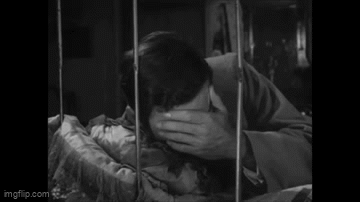
Part time job at a warehouse (early shift)
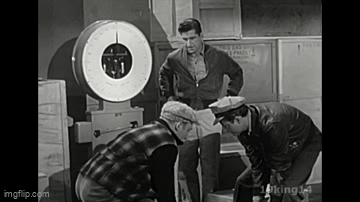
Drive to campus
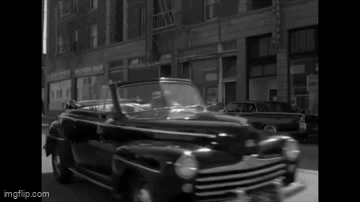
1st Class
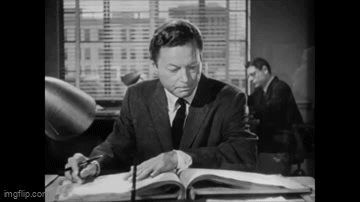
Walking across campus
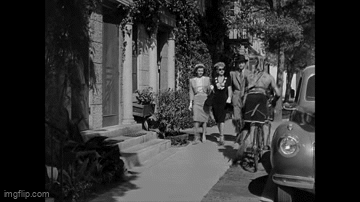
2nd Class - we know the answer!
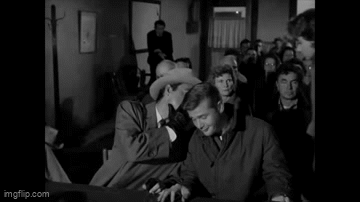
Lab hour
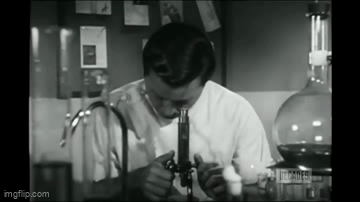
Walk to the gym

Kinesiology (MMA Course - luckily it's 100% attendance based)
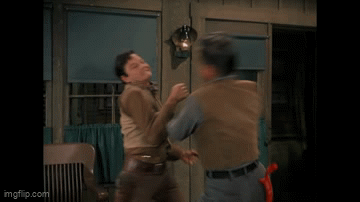
Lunch on the go
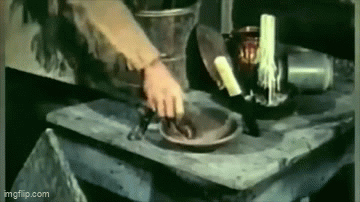
Research in the archives
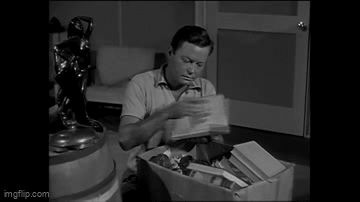
Extra curricular - Checker Club
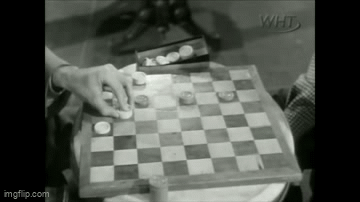
Group project meeting
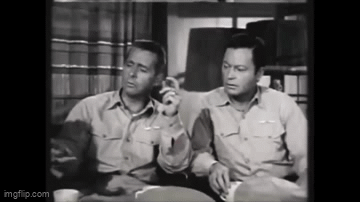
Dinner

Studying
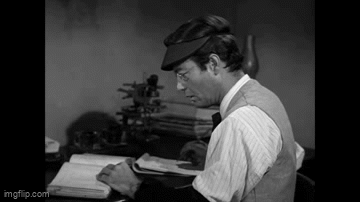
Night roomie. G'night
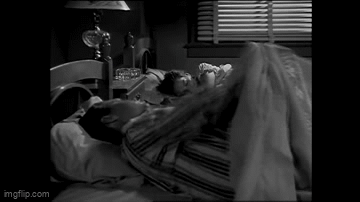
#deforest kelley#the world according to de's characters#college according to de's characters#gonna post these as I think of them as I hate sitting on stuff#because I get excited#silly y'all
43 notes
·
View notes
Text
5 Essential Tips for Mastering Scene Writing in Your Novel
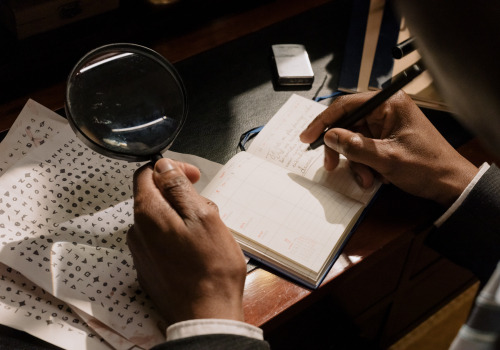
There's many parts involved when writing a scene. Knowing how these different pieces work together may help you move forward in your novel. NaNo Participant Amy de la Force offers some tips on brushing up your scene writing knowledge.
Scenes are the building blocks of a novel, the stages where characters spring to life, conflicts brew and emotions run high. Mastering the art of scene writing is crucial for any aspiring writer, especially in the lead-up to NaNoWriMo. But what is a scene, and how do you effectively craft one?
What is a Scene?
A scene is a short period of time — in a set place — that moves the story forward with dramatic conflict that reveals character, generally through dialogue or action. Think of writing a scene as a mini-story with a beginning, middle and end, all contributing to the narrative.
Why Scene Writing is Your Secret Weapon in Storytelling
Well-crafted scenes enhance your story to develop characters, advance the plot, and engage readers through tension and emotion. Whether you're writing a novel, short story or even non-fiction, scenes weave the threads of your story together.
Tip #1: Scenes vs. Sequels
According to university lecturer Dwight Swain in Techniques of the Selling Writer, narrative time can be broken down into not just scenes, but sequels.
Scene
The 3 parts of a scene are:
Goal: The protagonist or point-of-view (POV) character’s objective at the start of the scene.
Conflict: For dramatic conflict, this is an equally strong combination of the character’s ‘want + obstacle’ to their goal.
Disaster: When the obstacle wins, it forces the character’s hand to act, ratcheting up tension.
Sequel
Similarly, Swain’s sequels have 3 parts:
Reaction: This is the POV character’s emotional follow-up to the previous scene’s disaster.
Dilemma: If the dramatic conflict is strong enough, each possible next step seems worse than anything the character has faced.
Decision: The scene’s goal may still apply, but the choice of action to meet it will be difficult.
Tip #2: Questions to Ask Yourself Before Writing a Scene
In Story Genius, story coach and ex–literary agent Lisa Cron lists 4 questions to guide you in scene writing:
What does my POV character go into the scene believing?
Why do they believe it?
What is my character’s goal in the scene?
What does my character expect will happen in this scene?
Tip #3: Writing Opening and Closing Scenes
Now that we know more about scene structure and character considerations, it’s time to open with a bang, or more to the point, a hook. Forget warming up and write a scene in the middle of the action or a conversation. Don’t forget to set the place and time with a vivid description or a little world-building. To end the scene, go for something that resolves the current tension, or a cliffhanger to make your scene or chapter ‘unputdownable’.
Tip #4: Mastering Tension and Pacing
A benefit to Swain’s scenes and sequels is that introspective sequels tend to balance the pace by slowing it, building tension. This pacing variation, which you can help by alternating dialogue with action or sentence lengths, offers readers the mental quiet space to rest and digest any action-packed scenes.
Tip #5: Scene Writing for Emotional Impact
For writing a scene, the top tips from master editor Sol Stein in Stein on Writing are:
Fiction evokes emotion, so make a list of the emotion(s) you want readers to feel in your scenes and work to that list.
For editing, cut scenes that don’t serve a purpose (ideally, several purposes), or make you feel bored. If you are, your reader is too.
Conclusion
From understanding the anatomy of a scene to writing your own, these tips will help elevate your scenes from good to unforgettable, so you can resonate with readers.

Amy de la Force is a YA and adult speculative fiction writer, alumna of Curtis Brown Creative's selective novel-writing program and Society of Authors member. The novel she’s querying longlisted for Voyage YA’s Spring First Chapters Contest in 2021. An Aussie expat, Amy lives in London. Check her out on Twitter, Bluesky, and on her website! Her books can be found on Amazon.
Photo by cottonbro studio
#nanowrimo#writing#writing advice#scene writing#writing scenes#plotting#by nano guest#amy de la force
430 notes
·
View notes
Text
I want to share my own thoughts that rose up while reading Holmes as an aroace person!
Something in particular that resonated with me is Holmes's disdain for romantic attraction and love. Living, especially, in a world that does not acknowledge the a-spectrum, it is no surprise that any aro/ace person (even today) would feel alienated and misunderstood. For Holmes, this manifested as disgust and bitterness towards, in his eyes, the rest of the planet who seem to grasp it. Because of this isolation, it heightens Holmes's need to have himself understood. He lacks the language that we have today, and it only gets murkier with the then, and still vague and varying usages of the word "love".
It was not that he felt any emotion akin to love for Irene Adler. (SCAN)
This line has been interpreted to death, but with the belief that this is something Holmes had made very clear to Watson, it's him wishing under all circumstances for him to be seen as he is.
Living in a hetero-amatanormative world, gender plays a large role into Holmes's descriptions of men and women. Holmes struggles to admit that he finds women aesthetically attractive (especially early-canon), for example affirming that Irene Adler being "the daintiest thing under a bonnet on this planet", is only known to him according to the men on the Serpentine-Mews. However, he never heistates on commenting on a man's attractiveness. For example, Godfrey Norton, only a few short sentences later, is described by Holmes as "dark, handsome and dashing." Holmes feels no reluctance to describe men in such a way due to the fact that a Victorian culture would never mistake this for romantic interest.
We can assume that in the majority of cases, this is Holmes trying to clarify -- to not be seen as a romantic, which unfortunately then was understood to be equal with aesthetic attraction. It is very clear, however, that Holmes possesses one and not the other.
Later in the canon, he is seen showing open appreciation for women's beauty, not only in appearance but also character, such as Violet de Merville or Maud Bellamy. I speculate strongly that this came about from understanding love in a new way through his partnership with Watson, and finding that love comes in many forms, between any two people. Perhaps he no longer feels insecure about being seen as a romantic individual, because he has someone who truly understands him. I find that this is true on many levels for Holmes, not only on his lack of attractions, but also his eccentricities and deeper emotions, that were likely never properly understood by many.
It's always gotta make me tear up, huh? A huge aspect of H&W's relationship is accepting people as they are, so long as there is something worth valuing. They may be misogynistic, seem "positively inhuman" at times, or destroy their own body. But they may also just prefer a little solitude, communicate in a different way, or see the world differently.
#sherlock holmes#acd sherlock holmes#asexuality#aromanticism#aroace#Holmes IS aroace!!#Holmes & Watson mean the world to me#crazy how ACD made a totally aroace character before people had any real conscious ideas of it#bless my boys
316 notes
·
View notes
Text
The Raoul (de Chagny) Navy: An Exploration of the Vicomte's Naval Background:
Our beloved Vicomte, Raoul de Chagny, is a young junior officer in the French Navy ("le Royale"), but this hardly gets much exploration. It's a detail that is often glossed over--I anticipate because Naval historians and Phans often do not have much Venn diagram overlap--until now. Let's just say my username is a Naval reference.
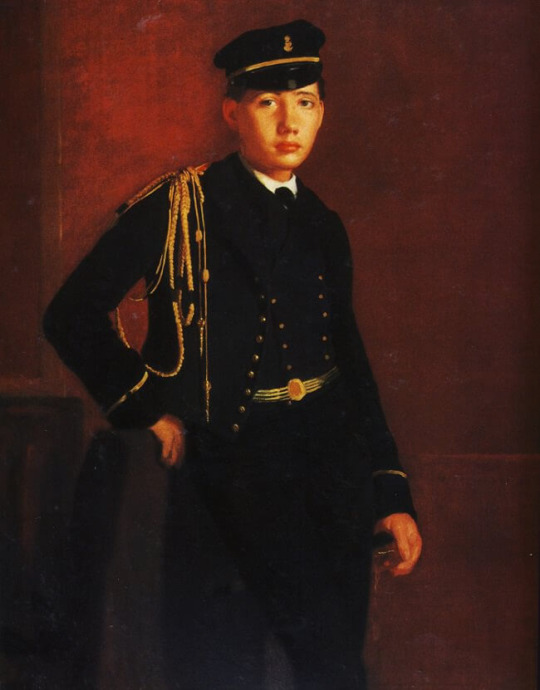
Note: the "Raoul Navy" is not my invention--our hilarious and wise "Phantom Dark Web" friends at Leroux Less Traveled (incl. @box5intern) came up with it, and I love it.
I've started digging into book Raoul and his Naval background and turns out we are missing out a whole lot about Raoul's character background if we don't dig into it. So I'm going to tell you what the book tells us and what that means. I'm going to give you the overall pieces up front, and then explain:
Raoul looks very young and feminine (except for his "little" mustache, which he effectively has grown to prove that he can)--and everyone treats him like a baby
Raoul at this point has already completed three years of Naval training including a world tour, so he is fairly experienced and even worldly for his age. He is described in the French as a "cadet", but he would likely be a sub-lieutenant at this point since he has graduated from the Naval Academy.
He's on a six month leave before going on a very dangerous mission to recover remains of a lost Arctic mission--a mission he himself is unlikely to return from.
And everyone still treats him like he's a baby (especially the old dowager widows), even though he has had quite a bit of life at this point--so he has something to prove.
What we know about Raoul and the Navy (Here is the English):
"He was admirably assisted in this work first by his sisters and afterward by an old aunt, the widow of a naval officer, who lived at Brest and gave young Raoul a taste for the sea. The lad entered the Borda training-ship, finished his course with honors and quietly made his trip round the world. Thanks to powerful influence, he had just been appointed a member of the official expedition on board the Requin, which was to be sent to the Arctic Circle in search of the survivors of the D'Artois expedition, of whom nothing had been heard for three years. Meanwhile, he was enjoying a long furlough which would not be over for six months; and already the dowagers of the Faubourg Saint-Germain were pitying the handsome and apparently delicate stripling for the hard work in store for him."
We also learn in another paragraph that the de Chagnys had admiral in the family, so the Naval connection is likely a family business for second sons. Raoul is a second son, so a career as a military officer would have been a distinguished career for him.
Borda: First ship
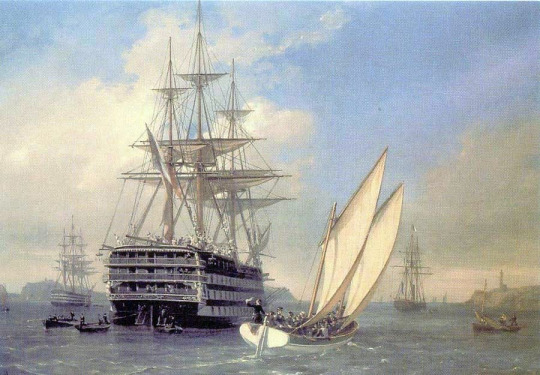
Brest is the main port of the French Navy and home of the Ecole Navale (or French Naval Academy. In the 20th Century it moved, but Brest is still, along with Toulon, a major naval base)
According to the French: Le jeune homme entra au Borda, en sortit dans les premiers numéros et accomplit tranquillement son tour du monde (Note that the French calls him a "young man", not a lad)
The Borda is traditionally the training ship of the French Navy, and there have been six of them. This would have been a cadet/midshipman cruise for Raoul. He would have been on the ex-Valmy, an 120-gun ship of the line, which became the Borda training ship in 1864.
The Borda is also the ship of the Ecole Navale (French Naval Academy)—this means that Raoul attended the academy.
The Naval Academy is two years in Brest, and then their third year is the World Tour—so that timing also aligns with where we are in the book. Raoul would have begun at the academy at 18, and he is at the start of the book, 21 years old.
After the Borda, which he completed with honors, he did an uneventful world tour.
This would have been his third year, still as a midshipman.
He could have been assigned to any ship for this training cruise—possibly a cruiser (the d'Estang is pictured below in 1884 in Algiers), which did long range missions. Note: Their max speed was about 15 Knots (which is a very respectable speed that some warships still transit).
This world tour cold have been as far east as what is now Vietnam, or through the Suez--but likely near French colonies.

With influence, he is assigned to the Requin expedition.
French: Grâce à de puissants appuis, il venait d'être désigné pour faire partie de l'expédition officielle du Requin, qui avait mission de rechercher dans les glaces du pôle les survivants de l'expédition du d'Artois, dont on n'avait pas de nouvelles depuis trois ans.
The Requin was a real ship in the Mediterranean fleet, but did not go on its first mission until 1885, which means that this is a deliberate or unintentional oversight of either Leroux himself or his narrator. The Requin was a steel hull—and the Artois was actually a 18th century Royal Navy ship so this piece is a complete fabrication. However, Arctic missions at this time were frequent and tended not to go well.
However, Raoul could also be excited about getting to go on a new steel-hulled ship. The Redoutable was already in commission—commissioned in 1876. Most of the rest of the fleet at this point were ironclads.
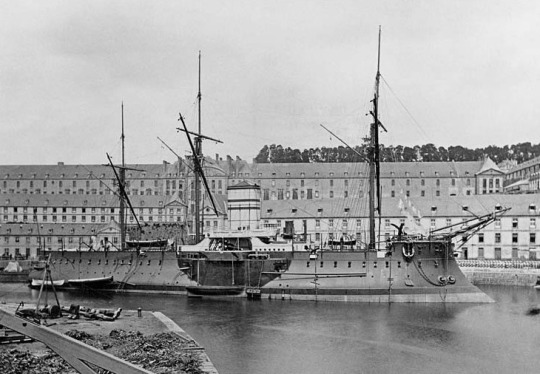
#naval history#phantom of the opera#raoul de chagny#vicomte de chagny#amwriting#phandom#military history#warships#poto#gaston leroux#the raoul navy#french navy#le royale#raoul navy
295 notes
·
View notes
Text
Fish: A Good Omens Sex Meta Thing
A deep dive meta on fish and that deathless death.
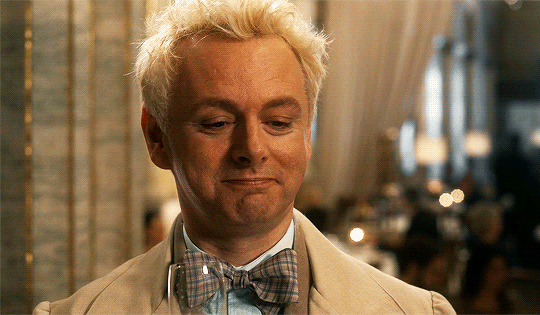

NSFW under the cut. TW: Mention of Satan's attacks on Crowley. Also for those who asked me for more on the Ineffable Husbands and trauma-informed partnership.
Aziraphale, listen to me. The supernatural world? It's a mess. Life under the sea is better than anything they've got Up there...
This is basically the requested "Crepes 2" but you don't have to have read that first. I did link it at the bottom if you have not and you're interested in more meta like this one. Thanks for reading. 💕
Couples. Romantic and/or sexual partners who have an understanding of a mutually-agreed upon level of commitment to one another and their relationship. Frequent celebrators of special occasions.
"A team-- a group; group of the two of us." A couple.
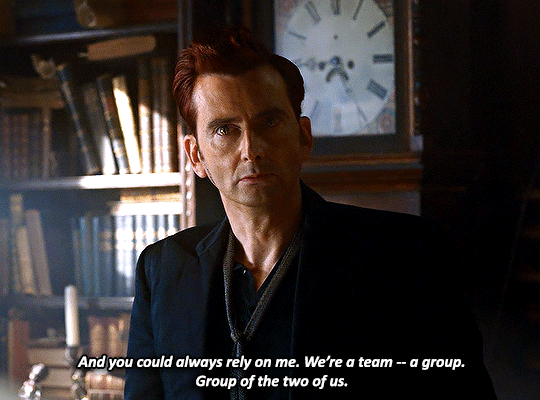
Special occasions. Notable life events celebrating milestones and past days significant to a couple's relationship.
"For special occasions." Why Aziraphale bought one dozen cases (144 bottles) of Chateauneuf-de-Pape in 1921, as he either tells or reminds Crowley on the walk to the bookshop in 2008. Only "a few bottles" were still left at that time, according to Aziraphale, after 87 years of Crowley and Aziraphale celebrating special occasions enough times as an unofficial couple between 1921 and 2008 to have drank almost 144 bottles of the wine they only drink on special occasions.
Wedding anniversary. A special occasion; the "big one" of a married couple's special occasions. Celebrated annually by married couples as a romantic day that honors their commitment to one another. In S2, the day of The Meeting Ball is the night that Armageddon: Round Two gets underway. It is also the wedding anniversary of...
Mutt and his beloved spouse. The lovely magician who owns Goldstone's Magic Shop in 2023 and his beloved spouse, who is dry-witted, trans and had on a dress the color of Crowley's eyes at The Ball. Paralleling characters to Crowley and Aziraphale.
Anniversary. For partners who are not married, usually celebrated as a day of significance in their romantic relationship, chosen for its importance to them. Almost always related to a "first" in the relationship, like the day they first met or on which they had a first date.
"This is The Big One, Crowley..." What Satan (while impersonating the voice of Freddie Mercury) said to Crowley about Armageddon while assaulting him in 2008, on the night Armageddon: Round One began. Crowley was supposed to be having dinner with Aziraphale at the time.
The 1.01 sushi scene. Our re-introduction to Aziraphale in 2008. A series of indicators that we learn throughout the course of the season teach us that Crowley was supposed to be with Aziraphale in the Japanese restaurant on this night before he was delayed by Hell, assaulted by Satan, and forced into helping to start Armageddon.
Various scenes in S1 show us that Crowley always comes up on the same side of Aziraphale if he is approaching him from behind when meeting him but we don't yet know that in the first scenes of 1.01. As a result, we might not immediately realize that the reason why Aziraphale opens his eyes and looks to his left after hearing a miracle chime in this scene is because he expected that it was Crowley arriving to meet him after having been running late. In reality, it turned out to be Gabriel on his right-- which Aziraphale first sees in a mirror and which will be mirrored in additional scenes in the show (Crowley dragged to Hell in 1827 and the Gabriel statue on the other side of Aziraphale, etc.). Dialogue from the scene set the next day in St. James' Park that we will look at later on in the meta also confirms that Crowley was supposed to be with Aziraphale in the 1.01 sushi scene.
The sequence of scenes at the start of the 2008 minisode also sets this up by giving us Crowley alone first and letting us revel a bit in how fun he is and like him even more. The contrast with Hastur and Ligur establishes for us that Crowley is about a trillion times smarter and more enlightened than these guys. It's the second scene with Satan, though, that exists to show us that while some of the demons are just idiots, demonic life for Crowley is actual hell.
The "Bohemian Rhapsody" he so endearingly rolled up blaring in The Bentley comes back and now takes on a nightmarish tone as Crowley receives instructions from Satan while driving The Bentley and we learn that Satan can possess him at will and Crowley's sunglasses-- even in the dead of night while driving alone-- start to make more sense. They're a defense mechanism but he's actually defenseless in the face of this threat. It's from watching Satan get in-- through the radio, taking over the music, speaking through the voice of a non-evil entity, jumping through the air and through Crowley's sunglasses through his eyes and into his mind and rendering his body immobile while he's driving The Bentley-- that we are taught the core of what it means to be a demon in Good Omens.
The demons belong to Satan, in Satan's view. They are part of his collective of souls who exist to serve him. They are not individual people existing independent of him. There is no such thing as bodily autonomy in Hell.
What Satan does to Crowley in 1.01 is a metaphor for sexual assault. It's a forcible attack on his body against his will and without his consent. Though the scene is mercifully short, we are left with the awareness that it is short for reasons of the plot in this instance-- because Armageddon is beginning and the purpose of the attack in this moment is to give Crowley directions on delivering the antichrist baby. The scene, though, shows us that Satan can do this to Crowley whenever he wants and Crowley-- an otherwise very powerful being-- has no known defense against it. Crowley is unsurprised by it and that, plus all his various defensive layers already in existence in 1.01, show that it has happened before. Crowley has been on Earth for 6,004 years in 2008 and the implication here is that these assaults have been happening periodically the entire time and are among the issues most responsible for the PTSD symptoms he shows throughout the show.
It's off of this assault, though, that we segue into our re-introduction scenes of Aziraphale in the present and they are, at the start, the exact opposite of this nightmare that Crowley is living. As Crowley is attacked in his car on a dark road alone at night and then has to narrowly avoiding killing a man in an oncoming truck, we move over to Aziraphale's world, not yet realizing that this is the world that Crowley lives in when he can get away from Hell-- that it is actually their world together.
Aziraphale is presented with the sushi from his friend who has prepared it specially for him and we listen to Aziraphale thank him. The Italian of "Bohemian Rhapsody" (symbolic in this moment of Dante's Inferno and Hell) gives way to Aziraphale speaking Japanese (symbolic of mindful living.) The tone is all kind and gentle-- respectful and peaceful. We then get what is, really, the exact opposite of what just happened to Crowley, which is Aziraphale taking a slow breath with his eyes closed, inhaling the scents of the brine of the fish and vinegared rice and the herbs, and centering himself in the present moment as part of the experience of enjoying his meal.

The immediate contrast is drawn between Satan-- Crowley's rapist, who terrorizes him-- and Aziraphale-- Crowley's partner, who loves him, and with whom he has the kind of consensual, mindful, sensual experiences he was supposed to be getting up to on this night when Armageddon began instead.
In S2, the importance of the sushi scene from 1.01 returns as it is mirrored during the attack on the bookshop. Once again, Crowley is away from Aziraphale when he should have been there by that point and Aziraphale is worried about him. Present instead is, once again, Gabriel. This time, Gabriel has undergone a bit of a Jim journey. (Aziraphale offering him hot chocolate instead of tea in 2.01 was also set up by the sushi scene, as it's off of Gabriel being grossed out by the "rose matter" tea, showing again how important the scene is.) In S2, Gabriel is with Aziraphale again, this time pushed back further into the bookshop, and where are they in the bookshop-that-represents-Aziraphale during the sushi scene mirror? They're upstairs, on the landing.
Specifically, they're just inside the top of the stairs in front of a room, the door to which we are shown several times in S2 but which we have not yet seen open.
We have gone into the room next door to it-- that's the guest bedroom, where Gabriel stayed during the season. By process of elimination and out of an idea of convenience here, the room we haven't been inside of that is located at the very top of the stairs is almost certainly Aziraphale's bedroom. So, we've gone from S1 and having Gabriel show up unexpectedly while Aziraphale mistook him for Crowley while he and Crowley were supposed to be having one of their sexy meals together to S2 and Gabriel now there in the mirror scene in front of their bedroom, drawing a bit of a correlation between what these two scenes are both about.
There's also something symbolic to the idea that S2 uses invitations and doors and rooms in the bookshop to symbolize Aziraphale himself and who he lets in and whose voices he is, for better or worse, listening to at different times-- with his mental health crisis being symbolized by the bookshop being essentially overrun to a point that anyone can now get in. The one room that is shown to us but the door to which never is opened in S2 is the bedroom door. The bookshop can get overrun and others can get deeper into it than we've seen before-- demons in the living room, Maggie and Nina and Gabriel upstairs and in the back kitchen table area like the family they've become-- but the bedroom door stays closed because only Crowley and Aziraphale are allowed in there. No one but them can open the door. Metaphorically-speaking... and probably literally as well.
As the sushi scene is paralleled in S2, we get Shax there bullying Aziraphale. Shax is jealous of Aziraphale and his relationship with Crowley and she also fails to understand it because she sees Crowley as a demon like her and presumes he's as dark as she is, having no idea that Crowley's demonic schtick is an act to survive. She gives voice to these questions (and to Aziraphale's most illogical self-doubts-- but self-doubt is never logical...) when she asks:
"Aziraphale, what *are* you? Crowley's emotional support angel? The softest touch? The one who went native? Do you need more big, human meals, Aziraphale? Shall we send up *the sushi*?"
Shax is actually doing something here, language-wise, that the show first did with Hastur in 1.01, and that's making them both useful idiots when it comes to language. Remember Hastur's mistranslation of "ciao" as Crowley leaves the graveyard with the baby? What Crowley said was, as we know, Italian-- Hastur got that bit correct-- but instead of translating it in his mind as meaning the "hello"/"goodbye" that "ciao" means in Italian, he confused it with its homophone of "chow", which he said "means 'food'." It does but in an informal way or in reference to food given to animals.
This is darkly ironic in the scene because of where Crowley is headed in the next scene-- and where he's supposed to be during both scenes. He's supposed to be "chowing down"/having food-- having dinner-- with Aziraphale and food is, as we'll learn over the course of the 2008 minisode, euphemistic for sex in Ineffable Husbands Speak and symbolic in relation to it in the show itself overall. Instead, Hastur isn't entirely wrong when he translates "ciao" as "chow"-- and he might have done so unconsciously in his mind because he knows Satan is going to contact Crowley with instructions soon. He sees Crowley as "chow"-- in the sense of food fed to the animal that is Satan.
In 2.06, while Crowley is taking Maggie and Nina to safety outside the bookshop, Satan is mentioned when Shax demands that Gabriel and Beez be given to her to take "as gifts for Our Master Satan." Dagon-- Head of the Dark Council and not known for mincing her words-- replies that Satan "wouldn't want them... maybe as hors d'oeuvres." Not a single person in the room-- which contains almost every major non-human character in the show shy of Crowley-- disagrees with this assessment. Rape is not about sex-- it's about power-- but in a show that uses food as euphemistic for sex on several different levels, Dagon's comment is chilling.
It not only takes the attacks on Crowley that are already a metaphor for sexual assault and codes them through food in such a way that the feeling you get from the 1.01 Satan scene-- how it comes with an implication that the assaults aren't always a delivery of instructions-- is correct and that, unsurprisingly, Satan is a rapist in every way possible, but it also sees someone who would know in Dagon state that Satan would not actually care that much about Gabriel and Beez. He'd rape 'em, sure, is what Dagon is saying. He's Satan. But they would be just hors d'oeuvres. They're not who he's really fixated on.
The Grand Duke of Hell who betrayed him and their former Supreme Archangel partner are not interesting to Satan is Dagon's statement and not a single person in the room challenges that. No one says anything about it and the scene is deliberately structured so Crowley is not in the room when it's said to create this reaction in the others... the implications of which are just horrible where Crowley is concerned.
Back to Shax in the bookshop attack scene...
Shax parallels Hastur here because they are using her lack of language skills to highlight something to us by what it is that she doesn't understand. Much like with Hastur unintentionally spelling out what's really going on through mistranslations of words, Shax is trying to bully Aziraphale and she's tossing insults at him that are, actually, in the alternative meanings of what she's saying, the answers to the very questions she's been asking.
"Aziraphale, what *are* you? Crowley's emotional support angel? The softest touch?..." In insulting Aziraphale, Shax is using Crowley's mental health issues as a way of insulting both of them here, which shows how Hell obviously isn't exactly the most trauma-aware place. She's obviously saying that Crowley is comparable in mental health issues to humans (whom the demons see as beneath them) who have a need for emotional support animals. Like Hastur with the "chow", there's an animal comparison being drawn beneath the words used here but instead of the ominous lead-in to Crowley being attacked in 1.01, in S2, we have it about Crowley and Aziraphale, not Crowley and Satan.
So, Shax is calling Aziraphale Crowley's pet, right? And then she calls Aziraphale "the softest touch", which is a phrase meaning someone who is really gullible. What Shax doesn't realize is that the other, human-derived meanings of what she just called Aziraphale are the answer to the question of what Aziraphale is to Crowley.
In British slang, "pet" is a term of endearment. To pet someone is to touch and kiss in a way meant to be sexually arousing-- as in, "heavy petting."
The softest touch. This is, quite literally, the definition of a caress.
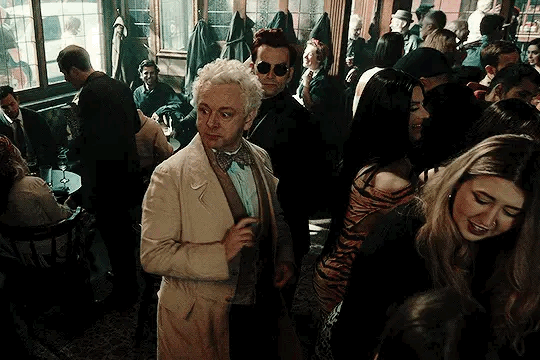
In S2, Aziraphale pats his and Crowley's pet-- The Bentley-- but he pets Crowley. The only time he tries to actually pet The Bentley is when he's semi-jokingly making it a sexual metaphor for Crowley. It underscores that Shax is almost there in getting it-- she's just not quite understanding the meaning of her own words-- which are words that, like Hastur's ciao/chow moment, exist to tell *us* something in how we look at them more than to tell the character speaking something.
In effect, we get a whole scene in S2 that parallels the 1.01 sushi scene by defining some more what it's really all about through Shax not quite fully getting it. What is Aziraphale to Crowley? is her question and the answer is the softest touch, just in the other meaning from the way that Shax says it. Aziraphale is kind to Crowley and gentle with him. He's the mindful sushi night in the face of the horror chow of Hell. They love each other. It's soft and sweet and that's why Shax has trouble understanding it-- it flies in the face of what she thinks the demon Crowley would want because of the reputation Crowley has sold everyone on regarding who he is, which isn't who he really is at all.
"The one who went native. Do you need more big, human meals, Aziraphale? Shall we send up *the sushi*?" Aziraphale is the angel who "went native"-- he lives a mostly human existence with Crowley alongside the humans. Shax clearly doesn't eat that much as no one has ever called sushi a "big meal" lol but besides that bit of humor aimed our way, this is more tying of food to sex. Aziraphale likes food and he likes sex and in Ineffable Husbands Speak-- which Shax does not speak-- food is euphemistic for sex. What's unnerving about this scene in this moment is that it plays like the later scene between Maggie and Shax does-- as if Shax is reading the thoughts of the character she's bullying and lobbying them back at her. She might well be doing this here and that's why the sushi comes up-- Aziraphale is thinking about it because Crowley should be here and isn't and Gabriel is right near him instead and it reminds him of 2008. (This wouldn't be the only callback to S1 in this sequence, either; there's Aziraphale explaining the fire extinguishers to Nina not that long after this.) Either way, it's writing designed to directly correlate this part of the bookshop attack with the 1.01 sushi scene to further underline what the 1.01 scene is about.
Okay, so, let's look then at why we're so into repeating bits of this sushi restaurant scene in GO and what it tells us about Crowley and Aziraphale's story by what other scenes it ties to...
As the 1.01 episode continues, we get another scene pretty soon after the sushi scene which adds another layer to this by recontextualizing our understanding of the sushi scene-- that's their lunch at The Ritz the next day, in which we learn that Crowley is rather into watching Aziraphale eat and Aziraphale loves it. This then helps to explain Aziraphale's look in the sushi scene when he turns to look in the direction of where he thinks Crowley will be on the left, before it clicks that Crowley is not there and he sees, instead, Gabriel on his right via the mirror on the wall.
Aziraphale hears the chime with his eyes still closed. His eyes are then still on the food when he reopens them and he hasn't had time to see that Crowley is not beside him before he turns in that direction and this is the expression on his face as he does:

That is a pretty sexy little look that was indisputably supposed to be given to Crowley...
In the later scene where they're at lunch at The Ritz, we come in on their meal at the end of it. Aziraphale is on the last forkful of his dessert and we get the idea of kinky lunch from what we see on the tail end of it. But before it? Back at the start of the episode, set the night before? We see that everything that happens the next day at The Ritz actually happens because they weren't able to be together the prior night. It will also help us to understand how Crowley knows about "the fascinating little restaurants where they know" Aziraphale in the St. James' Park scene.
The 1.01 sushi scene tells us that, by 2008, they sometimes sneak out to a quiet, dark place where they think they won't be seen to have dinner together.
What's most notable about the set of this scene in the sushi restaurant is the shocking brightness of one color in particular.
The scene leading into it, as we noted, is Satan's attack on Crowley in The Bentley and that scene is, appropriately, very dark. It's pitch black night outside and Crowley, in his perpetual black clothes, half-blends into the night around him. Flecks of grey and silver are the main sources of light in the scene. The same color scheme tips into the Aziraphale sushi restaurant scene-- with two exceptions. The silver grey remains (Gabriel) and so too does the thick, black darkness but there is more light in the restaurant and it shines over Aziraphale. He looks bright against the black darkness, even though he wears beige. He is the light that is missing from Crowley's scene. But that's not the shocking color to us in the scene. That's the one that saturates its way through the darkness around Aziraphale. That color is...
Pink. The color you get when you mix white (Aziraphale) into red (Crowley). Traditionally, a color of love, romance and health.
Pink plume. The energy field emanating from the bookshop when Crowley and Aziraphale performed a miracle together to protect Gabriel in 2.01. Also: part of Mrs. Sandwich's hair accessory during The Meeting Ball. Mrs. Sandwich represents sex and healthy communication in 'The Whickber Street Shopkeepers and Traders Represent The Stuff of Life' thing the show has going on.
"In the pink." A phrase meaning "in good health."
1967. Flashback scene in the 1.03 Cold Open in which Aziraphale gives Crowley holy water and they discuss their relationship-- specifically, trying to be more openly together. The scene is drenched by the pink light from the sex shops (one called the "Love Shop") that were then in the spot where Give Me Coffee or Give Me Death (symbolic of freedom) is in S2.
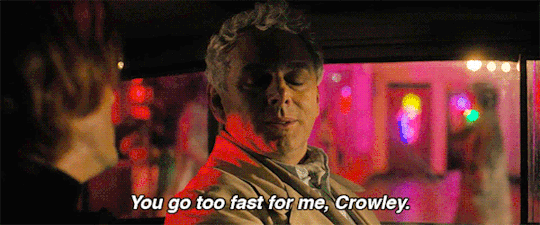
Jane Austen. One of the most famous writers to ever live (sorry, Crowley, but she is lol.) Writer of romance novels. A human that both Crowley and Aziraphale knew in the early 1800s. As Aziraphale brings her up to Crowley while they are talking about romance, pink floods the frame through the clothes on the extras in the wider part of the shot besides him. Pink is also present throughout this scene in general, which already parallels 1967 via it being related to set up, The Dirty Donkey and Crowley's turtleneck.
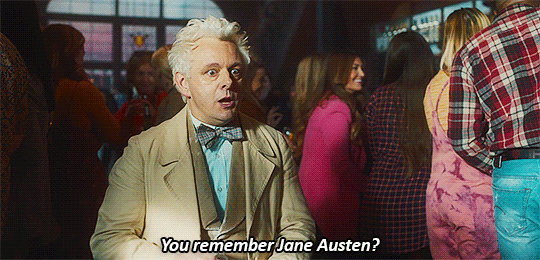
Back to the pink-dipped sushi restaurant in 2008... what else do you notice about this scene that is familiar, now that you've seen all of S1?
Maybe that Aziraphale is actually sitting at a bar? And thought Crowley would meet him there, so they would be sitting at the bar together? Aziraphale also had just spoken at the start of the scene with the restaurant person on the other side of the counter. Where have we seen one of them doing something like that before?
That other rather fish-oriented scene: Rome. 41 A.D....
Rome. 41 A.D.. Aziraphale runs into Crowley in a tavern in Rome. Crowley is miserable and not having the best day of his demon life. Frustrated by the temptations he's been sent to perform for Hell that have him enabling horrible men in the Roman military, he's lonely, tired and grouchy. This initially was worsened by the arrival of Aziraphale, whom Crowley always loves to see but who, in that moment, was a reminder of how broken Crowley felt.
PTSD. Post-Traumatic Stress Disorder. A psychological condition brought on as a result of experiencing the psychological shock of a traumatic event or events. Some symptoms of PTSD include disturbed sleep, difficulties feeling safe, difficulties trusting yourself and others, anxiety, depression, and intimacy issues.
"In the pink." Remember the phrase meaning "in good health'"? Not a lot of pink in the Rome scene... initially. 😉
"Salutaria." What Aziraphale says in toast as he and Crowley clink glasses. Means "to your health." Crowley clinked glasses but quickly looked away, leaving Aziraphale thrown in the moment as to why Crowley was not rejecting his presence entirely but seemed uneasy and was putting up some walls between them that he had not in this way up to this point.

So, why was Crowley doing that?

Anorgasmia. Modern, clinical umbrella term for all issues relating to disorders surrounding an individual's ability to orgasm. If physical or medicinal reasons are eliminated, however-- as they often are-- then anorgasmia is a psychological mind-body disconnect.
Not an arousal disorder. Sufferers of anorgasmia still experience desire, compounding the impact of the disorder.
Secondary anorgasmia/situational anorgasmia. The inability to orgasm unless under certain conditions, such as through self-stimulation (masturbation). The inability to enjoy partnered sex. Extremely common in rape/sexual assault survivors.
(Diagnosis for anorgasmia are related to biological sex but Crowley is able to switch that at will so he'd be both of these, which are fundamentally the same thing.)
Hot Water Boiler. Device which heats up water in a house or apartment. In S2, a metaphor for anorgasmia.
In S2, Shax is living in what used to be Crowley's apartment and asks him if he knows how to fix the hot water boiler, as it has "two yellow lights" and isn't working. The point is that this used to be Crowley's apartment. Crowley, in 2023, knows how to get beyond a bout of it. He's fixed his own metaphorical hot water boiler-- and also the literal one when he used to live in that apartment. And while he's being sarcastic because Shax won't stop hounding him and Aziraphale, he's also giving her the most sage advice he knows, as he has continuously been doing during the season. In this case, it's to self-love a bit (which is actually prescriptive for anorgasmia in our modern times as well.) That he does is suggestive of the prior issues with secondary/situational anorgasmia.
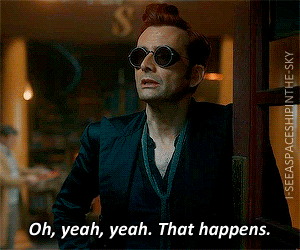
Alcohol (in Ineffable Husbands Speak). As we looked at in the Crepes meta: Surface layer: alcohol. Hidden language layer: Sex. Quite extraordinary amounts of alcohol. An extremely alcoholic breakfast at The Ritz.
Whiskey. Alcohol. What Crowley orders in a bar. Usually Talisker, which is a single-malt scotch. (Scotch being whiskey made in Scotland.)
Broken bottles of whiskey. What was in the case Crowley brought Mrs. H in 1941 at the start of the sexual metaphor that is The Bullet Catch.
Trauma-informed partner. Modern term for a romantic and/or sexual partner of a trauma survivor who is aware of the pervasive nature trauma can have on a person and who endeavors to provide a sense of safety-- physical, psychological and emotional-- for their partner and to create a relationship centered on healing and recovery, rather than one that causes further distress.
Frequently survivors of one or more forms of abuse themselves, as Aziraphale is. Not expected to be perfect but just to do their best by their partner.
Characteristics of trauma-informed relationships include kindness, empathy, mindfulness, gentleness, well-earned trust, a sense of playfulness, and a well-developed shared sense of humor. (Sound familiar? 😊)
The Bentley. Crowley's car and Linus blanket. As sexual metaphor, when Aziraphale is feeling cheeky: Crowley himself.
Driver's license. Documentation that must be obtained in order to operate a motor vehicle. Requires permission, experience, necessary skills, and willingness to learn. In London, not originally necessary to drive upon the invention of cars, until everyone realized what an absolute disaster that was. Aziraphale long ago passed his test and has had a driver's license since shortly after Crowley bought The Bentley. They did not require licenses at that time but always-eager-to-be-thorough Aziraphale made them give him a test to be sure he was truly qualified to drive.
As sexual innuendo: Crowley, we're absolutely ridiculous. You won't give up your car and I wall myself off in a fortress of books I can't part with but you've been "in my bookshop" and I've been "driving your Bentley" for an absurdly long amount of time. We even swapped bodies a few years ago. It might not actually be possible to be any more intimately familiar with a person than we are with one another and we both know I had these car keys the moment I asked for them so hand them over. No one was exactly a trauma-informed partner in those days but I was-- aren't I marvelous?😉I'll treat your car as gently as I treat you. Give me the keys or I will just keep going until I run out of car sex innuendo and I should warn you that I have lots more...
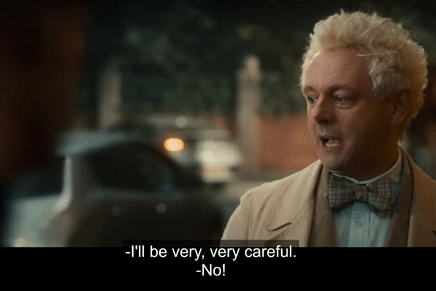
Trauma-informed partner. Aziraphale.
Mindfulness. A state of mind that focuses on being in the present moment by being conscious of one's thoughts, emotions, and bodily sensations. A state of the mind being connected to the body and experiencing the present moment consciously and fully. Frequently used to help combat PTSD, anxiety and depression. Also frequently used as a therapeutic intervention for assault survivors experiencing intimacy issues.
Aziraphale and Crowley smelling the magic shop in Season 2 and Aziraphale inhaling the scent of the sushi in 1.01 are both examples of mindfulness exercises. The sushi scene is tied to sex, as the food kinky thing is a form of foreplay, suggesting a focus on sexual mindfulness in bed.
Mind-body connection. What is in need of repair in sufferers of situational/secondary anorgasmia. Sexual assault causes the body to associate a loss of control with being under threat. Whereas people who have not experienced a violation of their bodily autonomy tend to respond to sexual stimulation with a response of pleasure, those who have been hurt have bodies that are wired to react to being touched or to feeling out of control as if they are under threat again, even if they are intellectually aware that the new situation they are in is not dangerous. What is arousing for others can cause a sense of anxiety instead of pleasure. There is also the risk of flashbacks to being attacked.
Healing the mind-body connection requires a trusted partner with whom the person suffering from anorgasmia feels safe and who is willing to help keep their partner in the present moment and help them "re-wire" and recover their body through new, positive experiences.
Asmodeus. The Demonic Prince of Lust. Crowley. A persona to have in Hell to give him big reputation that didn't involve him having to kill anybody and that also acted as a cover for his anorgasmia.
"Crowley." What Crowley asked Aziraphale to call him in 33 AD, just 8 years prior to Rome. An admittance of being mad about Aziraphale.
"What am I supposed to be, an aardvark?" In Rome, as Crowley grows nervous by this wine-drinking Aziraphale who also has nothing to do for the evening that has shown up in his world on a miserable day, he responds to Aziraphale's "still a demon, then?" nervous chatter with a line of his own, asking what else he was supposed to be? An aardvark? Of course, if Crowley was not a demon, being with Aziraphale would be easier and he wouldn't be in this mess in the first place but an aardvark is not just a random animal that Crowley thought up here.
Just prior to this moment, Aziraphale had approached him with "Crawley-- Crowley" and a soft smile. It wasn't actually a mistake on Aziraphale's part but a silent question: is it still alright to call you that? Thanks to S2 and the Job minisode we can see the 33 A.D. scene- in which Aziraphale learns of Crowley's new name-- in a different way. We see it as Crowley romancing Aziraphale a bit-- responding to Aziraphale being obviously a little jealous of Crowley's reputation as the wild Asmodeus with a whisper of how he'd changed his name to "Crowley"-- something that we know now that only Aziraphale understands. In Rome, eight years later, Aziraphale is asking by saying both names if that's still something Crowley feels-- and silently saying he hopes it is by subtly asking and by flirting with him a bit.
Crowley doesn't object to Aziraphale calling him "Crowley" and that encourages Aziraphale to join Crowley, who sends signals that he wants his company, even if he's grouchy. Maybe especially because he's grouchy. He can be grouchy around Aziraphale, who is his friend and will listen.
Aardvarks. Primarily eat ants and termites. In the insect metaphor in the show, humans are ants. (The "ants go marching" of The Flood scene.) Demons were hornets in this analogy but also flies and one could assume that termites might also be a good demonic insect analogy, as termites eat decaying plant material and demolish the dying down into the ground. Since food is sexual metaphor on Good Omens and living creatures are metaphorical in multiple ways, being an aardvark then is being someone who both fucks and kills other demons and humans. Being an aardvark is actually a good metaphor then for what's expected of Crowley in Hell and he obviously has some issues with it.
He doesn't want to kill anybody and he's sitting there wearing Roman military regalia, having been sent by Hell to facilitate some death and destruction in a way that he hasn't been able to Bildad his way out of this time. Aziraphale's presence is always welcome but Crowley's crabby in this moment because he knows Aziraphale is in a place by this point where he wants to sleep with him and they just ran into each other in a tavern and both clearly have the night free and now Crowley's got to decide if he's going to tell the angel or not that he's a disaster of an aardvark.
Aphrodisiacs. A substance purported to increase sexual desire. Named for the Greek goddess of sexual love and beauty, Aphrodite, who has been depicted since antiquity usually nude and on the shell of an oyster (or, occasionally, a scallop), as both are two of the oldest purported aphrodisiacs known to man.
Oysters. History's foremost food-related aphrodisiac... though that's not really proven. A few years ago, Italian and American scientists did a joint study to attempt to prove if oysters really did increase virility. What they found was a very minor increase in testosterone in men brought on by one of the compounds of oysters (which is also found in some other kinds of shellfish.) The difference was so small, though, that the scientists determined that an individual would have to consume a lot of oysters (like, a bucketload) to notice any significant difference. In other words?
Whether it works or not is, like with almost all aphrodisiacs, in the mind of the individual. If you believe it will work, it likely will. It's mind over matter. If you want it to work, it probably will. Thematically, an interesting thing to throw in a scene involving a character deciding he's in a place to work on overcoming psychologically-based anorgasmia.
The ancient Romans were obsessed with the oyster-- particularly the soldiers of the Roman military. Much of the cultural awareness of oysters as having a reputation today as being sex-boosting food is actually rooted to the beginnings of that trend in ancient Rome. Both Crowley and Aziraphale would have been aware of the reputation of the oyster in 41 A.D. and Crowley wearing military regalia might have been one of the reasons, in particular, that Aziraphale chose oysters as an euphemism to convey his meaning.
Oysters. Fish. To eat them, you have first got to get them out of their protective shells.
Adam and Eve. The first humans and the other inhabitants of The Garden of Eden. Parallels to Crowley and Aziraphale. Eve gave Adam food-- showed him the pleasures of eating the apple. It sent them on a path of sensual exploration and Adam, freed by Eve showing him food, gave her sex in return.
The other two in Eden at the time-- The Angel of the Eastern Gate and The Serpent of Eden-- are actually no different.
Crowley tempted Eve but Crowley also parallels Eve to Aziraphale's Adam. Crowley encouraged Aziraphale to try the ox ribs and unleashed the raging hedonist that Aziraphale can be. Rome in 41 A.D. is Aziraphale then realizing just how much they are Adam and Eve. (Something that they become aware of over time and is at the root of things like Crowley dryly saying that it's "time to leave The Garden" in 2019 in S1, when they leave a park to go have kinky lunch together.)
By Rome, Aziraphale is now a devoted gourmand. He also drinks now; he's tried wine at some point in the interim years between the Job minisode and this scene. (This is the first scene in which both Crowley and Aziraphale drink and the first time we see them share a toast-- something that becomes symbolic of them as lovers in scenes in the future, like its parallel scenes in 1941 and 2019-- furthering the suggestion of Rome as the start of their sexual relationship.)
Aziraphale might be in Rome on Heavenly assignment but that's not what he mentions to Crowley, if he is. Instead, he talks about Petronius, whom he assumes from Crowley's military clothes that Crowley will know and whom Crowley does. If referring to, as we suspect, Gaius Petronius Arbiter, then Aziraphale is referring to a being so queer even the historians can't get around acknowledging it-- a courtier who was the taste and style maker of the Roman empire, and who is believed to be the author of The Satyricon, which is basically the foundation of satire in literature but also famously contains a whole chunk of it that is just basically erotica.
Some details of Petronius' life are a little vague so Good Omens is exploiting the wiggle room here to suggest that he actually did own a restaurant. In reality, Petronius wrote in The Satyricon a description of ancient Roman feasts that have been seen as maybe barely satirical because of the whole bacchanalia of the period that Petronius was satirizing. So, by 41 A.D., Aziraphale is moving in wealthy human queer circles in ancient Rome and enjoying all of the pleasures life on Earth has to offer... and he's found Crowley alone in a tavern and is throwing as many of these things together in a sentence at one time as possible to convey an overall sense of would you like to join me?
The Job minisode has already happened. Aziraphale is more than aware that Crowley was enjoying watching him eat. They're both here with the night free and blending in amongst the crowds has never been easier than it was in highly-populated Rome. Aziraphale is used to picking up humans and it's different than it is with Crowley, who is quasi-immortal like he is and his friend and somebody for whom Aziraphale has feelings. There's also something funny about the fact that Crowley is in a (literally) hellish mood and Aziraphale is pretty undeterred and still goes for it. In attitude, Aziraphale is basically like You're in a terrible mood--you need to get laid, Crowley. Lucky I showed up, isn't it? 😂
Meanwhile, Crowley is fully aware of what Aziraphale is up to. He's known since he heard Aziraphale approaching him and has been mulling over how he's going to handle it. The grouchiness isn't just about his bad day-- it's anxiety manifesting as crabbiness. To his credit, Aziraphale seems to get that even before Crowley more specifically shares the source of that anxiety.
So, Aziraphale goes for it and how he does is to pick up on their way of speaking to one another euphemistically that they started in Job's courtyard and introduce food as a way of speaking about sex. This is already amusing in S1 but it's funny as fuck after S2 when we know that the ox ribs have already happened at this point and that that's why Aziraphale is going this route. Aziraphale's like how to see if Crowley wants to smash? Tell him I'm hungry wink wink... 😉
I would also like to point out that they are already in a tavern that sells food. In the wider shots of Crowley in the second half of the scene, a plate of food is on the table beside him. There are oysters *in this bar* lol. Oysters were not uncommon in ancient Rome by this point-- if this conversation were really entirely just about trying this particular kind of seafood, they could just order some from the woman who served Crowley his drink who is three feet away for the entire scene and try oysters right here.
By bringing up Petronius and another restaurant where they sell sexy fish, Aziraphale is laying down an ancient Roman, euphemistic equivalent of do you want to get out of here?

To tell Crowley that he [Aziraphale] hears that Petronius "does remarkable things *to oysters*." To ask Crowley to go to bed with him.
Specifically, to see if the food kinky Crowley wants to go with him to Petronius' new restaurant and try these oysters the human guys are so on about and then go back to where Aziraphale is staying and see if the oysters really do anything to their oysters.
With this one sentence, Aziraphale has just turned "oysters" into three specific, separate-but-interrelated things at once:
1) oysters are fish-- just the seafood itself-- as we're always also talking about the thing on the surface level as well in Ineffable Husbands Speak and this is no different. Petronius makes some yummy oysters, according to the restaurant reviews of ancient Rome, and his new restaurant is an opulent food orgasm of a place and Aziraphale correctly thinks that would be appealing to both of them. He loves to eat and Crowley loves to watch him eat and does Crowley want to go on a little date to do that-- just also with actual sex this time?
2) oysters are aphrodisiacs-- Aziraphale is bringing up the fact that everyone is talking about how eating oysters can increase your sexual desire and bring about more pleasure for you and your partner(s) in bed. Aphrodisiacs are evocative of partnered sex. Not that you can't take them for fun times on your own but most people do not so bringing them up then sets up the verbal italics of "to oysters" that lands Aziraphale's invitation, unintentionally, straight in the heart of Crowley's issues, because:
3) oysters are a partnered sex orgasm-- Aziraphale says he (Petronius) "does remarkable things to oysters" so Petronius makes delicious oysters, which are what you eat to increase sexual desire and therefore what apparently cause you to experience more pleasure for longer and to climax harder... the innuendo is that the oysters (the aphrodisiacs) do things to your oysters (your orgasm).
Surprise twist, Aziraphale...
Crowley has made sure it never occurs to anyone that he has problems in bed and that has included Aziraphale up to this point.
Crowley basically now has a couple of choices. He can gently rebuff Aziraphale's offer, hopefully without embarrassing him too much, and they can try to pretend this never happened, and then he knows that Aziraphale is probably never going to ask him again. Not an option. Who knows when else they might find each other with the night free like this again? and Crowley does want to try.
He can pretend there's nothing wrong with him and stress himself into a disaster, like he's probably tried to do with humans before but they die within a couple of decades and take the embarrassment with them but Aziraphale's going to live for ages, is really his only friend, and Crowley's in love with him. Crowley's self-sabotaging at times but he's also an optimist and a romantic, and it's those things that give him some hope that he might not be permanently broken.
Finally, there's that he can just tell Aziraphale the truth because, let's be real here, the angel wants to try it and like hell is Crowley saying no to that.
So, he doesn't.
(Note the red squiggles on his costume that look pink in the light and like a heart monitor jackhammering-- with anxiety, with arousal-- and the candle that burns a pink flame where the light hits the jug.)

"I've never eaten an oyster." Aziraphale has defined an oyster between them as an orgasm had during partnered sex and that is what Crowley is saying he's never had.
He's also possibly saying that he has never eaten an actual oyster-the-seafood, because even though they were pretty common in Rome in the era, Crowley eats less than Aziraphale does, apparently hasn't been in Rome that long, and has had, until this moment, no reason to try the fish everyone is throwing back to try to increase their sexy times as Crowley's just been avoiding any sexual situation like the plague.
This is both a leap of faith on Crowley's part and a moment indicative of just how much he trusts Aziraphale. He needs every other living being to believe he's Asmodeus but Aziraphale can have the real, unvarnished truth because Aziraphale is the only person Crowley trusts not to hurt him. He knows Aziraphale can keep his secrets and that they have their own private world where vulnerability is allowed. He knows that Aziraphale is his friend beyond anything else.
This is telling Aziraphale that he'd like to try but he's kind of a mess. He doesn't want Aziraphale to feel like it's his fault if this doesn't work and he wants him to know what he's getting into. Crowley has long harbored a suspicion, though, that it would be different with Aziraphale, which is also why he wants to give it a try. If the angel can't help him rewire himself here, no one can.
Emphasizing this is Aziraphale's reaction. If they had been talking about pizza, maybe this reaction would have fit lol but it's clearly not a reaction to learning that Crowley has never consumed one particular kind of squiggly, hard-to-eat, honestly not that great seafood. It's a reaction much more befitting learning Crowley has not experienced something far more delicious and life-affirming than actual oysters-the-seafood.
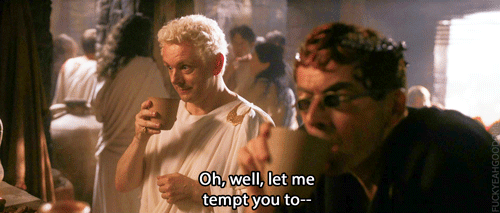
"Oh-- well, let me tempt you to--" Just consider this moment from Aziraphale's perspective for a minute...
Serpent of Eden Crowley? He is literally the spark that lit the flame of all of humanity here. By tempting Eve into free thought and sensual pleasure, he also empowered her into teaching Adam these things. As a result, Crowley is basically responsible for sex on Earth-- for all of its history. If you live in the Good Omens universe and you've ever had an independent thought, a sensuous experience, or an orgasm, you owe Crowley a thank you note.😂Every play Aziraphale has ever seen, every meal he's ever enjoyed, every human he's ever taken to bed-- all of those experiences are indirectly because of Crowley.
Aziraphale has wanted him for quite literally ever. He compares everyone else to him. No one else has ever made him feel like this. He knows they're attracted to each other but he never felt like he knew what, if anything, he had to offer Crowley. The hottest being he'd ever seen freed him from the prison of his own repression here-- what could he ever give Crowley that was worth something like that? How do you learn together and try new things and adventure together with someone who seems like they're leap years ahead of you and know all the things it took you a long time to find out?
It's at "I've never eaten an oyster" that Aziraphale realizes that the being who freed everyone else got left behind and Aziraphale can fix that. He is good at burning holes in prison walls. Protection and arming others against threats to them and healing and kindness-- that's what he does. He's been here thinking for ages that Crowley would never need anything from him that he knew how to give like this but now he sees it differently. They've shown each other already by this point that they're good at being partners but this one aspect of it always felt to Aziraphale like it would be imbalanced. In Rome, he realizes that it isn't.
Aziraphale doesn't have the vocabulary we have today for these sort of issues and Rome wasn't exactly a bastion of trauma-informed sex lol but he didn't need any of that because he's intuitively good at this. He already knows that it will be fine because Crowley doesn't know it yet but he effectively already told him that it will-- by telling him in the first place. Aziraphale knows that trust and desire are what's needed and that they have those in spades. All he really has to do here is help Crowley relax and get out of his head.
Or, as Aziraphale will put it during the 1941 sexual metaphor that is The Bullet Catch plot: "You do the shooting. I'll do all the hard bits."
What gets Crowley's attention in Rome is how utterly confident Aziraphale is. How empathetic but unpitying. Aziraphale doesn't hesitate and he trips over himself accepting the challenge-- which is awfully cute-- but it's that Aziraphale doesn't treat him like he's broken or seem to see this as daunting that works for Crowley. There is a lot of internalized shame and fear and pain associated with anorgasmia and Crowley has been stewing in this for a very long time up until Rome so for Aziraphale's response to be not dismissive of it but, instead, reassuring, was exactly what Crowley needed. Aziraphale's whole attitude is oh ok no problem should we get going now or..? While he was not happy about Crowley having had difficult experiences before because he doesn't like to think of him in pain, he was really into the idea of Crowley thinking it could be different with him.
Aziraphale really, really, really likes being the person Crowley let in enough for this. Pardon the Crowley pun here but Aziraphale has never stopped crowing about it between them in thousands of years and if Crowley weren't besotted with him, he would have murdered him over it by now. (See: an example in 1941 that we'll look at near the end of this meta and "I had to miracle in the cherries" in Good Omens: Lockdown.)
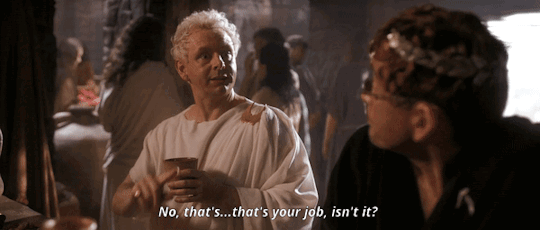
"No, that's... that's your job. Isn't it?" Aziraphale's use of "tempt" to offer Crowley sex is then something of a joke between them because neither of them are tempting each other in a demonic sense of the word at any time. They find each other tempting though, in the sense that they find each other attractive. To use "tempt" with one another is just to ask each other if they are in the mood for something, not to influence the other into doing anything ("tempt you to a spot of lunch?" and "temptation accomplished" in 2019.)
This is really established first in the Job minisode, chronologically, as Crowley didn't so much tempt Aziraphale to try the ox ribs so much as he just offered them to him and Aziraphale decided to without influence. The same is true for Crowley choosing to try sex with Aziraphale in Rome-- he's really already chosen to by not saying no and that's all before Aziraphale's "well, let me tempt you--".
When Aziraphale replies to Crowley's reaction to the "tempt" line with "No, that's... that's your job. Isn't it?", Aziraphale is teasing him a bit. He's saying he sees through Crowley's massive control issues and that he gets him. You always have to be in control but you don't always want to be. Well, today's your lucky day, Bildad, because we're partners in this now.
Or, as it's known in 2023:

Flame burning pink as Crowley smiles a little for the first time in the scene:
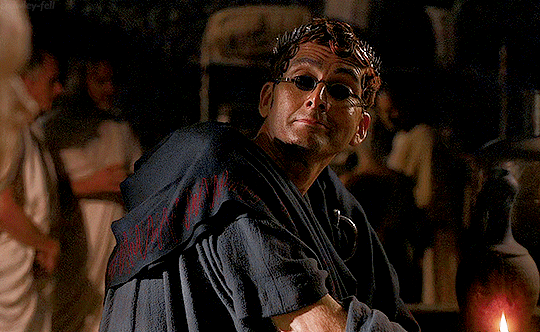
"Oysters! Oranges!" What Juliet (the woman selling snacks) calls out as the opening dialogue in the 1601 scene to entice prospective buyers, the only one of which really is Aziraphale. Oysters-- aphrodisiacs. Oranges-- cinematic symbol of death. Aziraphale chooses...
"Some grapes please! They look scrummy." Grapes. Fermented grapes are wine. Wine is alcohol. Alcohol is sex. We haven't a need for oysters anymore and we shun symbolic death in favor of the little death. The grapes look "scrummy", shortened version of "scrumptious", meaning both "delicious" in food terms and "sexy enough to eat" in people terms. Aziraphale eats them in front of Crowley during the scene.
Oysters. What Crowley and Aziraphale had in ancient Rome.
Oysters. What Crowley and Aziraphale had in ancient Rome.
Oysters (in Ineffable Husbands Speak). Both an aphrodisiac and an orgasm, but...
...since they don't want to bring up anorgasmia every time they're flirting or talking about sex for the rest of their very long lives... and since oysters on their own are really hard to work frequently into conversation and would get a bit old pretty quickly, they need another word.
So, based on what we've seen in the series, it evolved into...
Oysters = Fish.
Fish live in the ocean, amongst other sea creatures.
Fish & sea creatures (in Ineffable Husbands Speak). An orgasm.
Anything related to the ocean (in Ineffable Husbands Speak). A metaphor for sex.
If it is in or lives in water, it's prime material for climatic innuendo. If it has multiple meanings in English? It will be used frequently as part of wordplay. If it pertains to the ocean or lends itself to destructive adjectives (shipwrecks, sea monsters, bubbling seas and rising waves), it will absolutely be a sexual metaphor at some point.
Such as...
Wahoo. A kind of fish. Also: an exclamation of joy. For obvious reasons, Crowley and Aziraphale's favorite fish joke.
In 1941, Aziraphale seeks feedback in the dressing room on their sexual metaphor Bullet Catch performance-- that they are both more than aware of-- and Crowley agrees that it went well and dryly suggests they "chalk up a win for the side of the angel", turning the common phrase that is usually "...side of the angels" singular to reflect only Aziraphale, who is over the moon that Crowley enjoyed it and cheekily replies "wahoo!" before their flirting is interrupted by Furfur.
Decades later, Crowley gives another stellar performance-- the full, epic saga of his M-25 Orbital Disruption-- to the joyless, miserable lot in Hell and concludes it with a line that he plans to tell Aziraphale later to make him laugh:
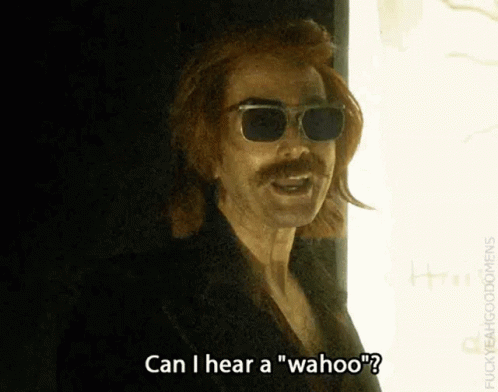
Carp. A kind of fish. Also means: to stand around and bitch. Aziraphale telling Crowley to stop standing around getting off on grouching and go get Maggie and Nina for The Meeting Ball in S2.
Gravlax in Dill Sauce. Cured salmon. This one is special and we'll look at it in the Dill Sauce meta about the St. James Park scene soon.
Ducks. Waterfowl. Aquatic birds. This is long enough. 😂 They are a whole separate meta.
Pickled herring. A kind of fish, cured in salt. What was dumped out of the barrel by Elspeth in The Resurrectionist minisode so she could use the barrel to transport her corpse. Crowley and Aziraphale spend half the minisode dragging around a barrel that should contain fish (the little death) but actually contains a corpse (actual death)-- foreshadowing the fact that their date will end with Crowley dragged to Hell and the start of the holy water arc of misery for them.
Red herring. A dry, smoked fish that turns red as it is smoked (ooh la la...) 😉 Also: A literary device, in which something is established with the intent of it distracting the audience from something else in the story. Elspeth and her pickled herring barrel are a red herring that changes The Resurrectionist minisode story from what the audience thought it would be into what it is, distracting the audience from the fact that the story actually began with Crowley and Aziraphale meeting in a graveyard at midnight for... ah... reasons. Aziraphale also turned 'red'-- turned to Crowley's side-- during the course of the episode, even as his shot at getting him some "pickled herring" that evening went up in hellfire smoke.
"Sargeant Shadwell." The hilarious, Sean Connery-esque way that Crowley said Shadwell's name in 1967, made funnier by the fact that a shad is a type of fish... and part of the herring family and this scene itself is a red herring. It misleads the audience into thinking we have a whole new plot about Crowley leading a break in to a church that is rendered inert within a matter of minutes when Aziraphale gives Crowley holy water. Shadwell's name is basically 'Fishwell' and, for Madame Tracy's sake, I hope that's true and not ironically funny. Either way, doubtful that Crowley and Aziraphale haven't joked about his name before. Shad also phonetically sounds like 'shag', the British slang word for fucking, and Crowley's tone of voice in the scene had a ring of 'shag' connotation to it.
Kieler Sprotte/Kieler Sprotten. A German smoked herring dish. A hidden reference in the Baraqiel entry in 'The Demon's Guide to Angels...' book that Furfur had in 1941. Baraqiel is Crowley and the entry, based on what's in it, was written by Aziraphale. One of you requested a meta on Baraqiel so that's on deck for now.
Newt. A semi-aquatic salamander. They live in the water but only some of the time. Also: Newt Pulsifier, an extreme parallel of Crowley who breaks all technology he touches, loves his less-attractive-than-The-Bentley car, and falls for a being who has issues with the purpose they feel they were put into the world to fulfill. Newt gets "in the water," metaphorically-speaking, when he has sex for the first time in S1 with the Aziraphale-paralleling Anathema, which is another example of how he's a more extreme version of Crowley, whose parallel to Newt is Aziraphale helping him through his intimacy issues.
Flounder. A kind of fish. Also means: to struggle helplessly in water. "To flounder" is frequently confused with "to founder", which is wordplay intentionally being used by Aziraphale in the "Seeds of Destruction" scene in S1, which we'll look at in the requested Seeds meta soon.
Bananafish. A kind of fish. Also: the first two words of Aziraphale's magic words. Is it "bananafish" or is it "banana, fish"? It's a little unclear and possibly situational. It's also likely both and a reference to wordplay and sex via fish. "The Bananafish" is also a short story by J.D. Salinger about trauma, PTSD and suicide that correlates to S2 quite a bit but we can look at that in a more Aziraphale's-trauma-centric meta.
The 'drunk-in-the-bookshop' scene. Part of the 2008 minisode, in which Crowley and Aziraphale are drunk and talking on the surface about Armageddon but are actually flirting with each other using sea-related terminology to make some drunken sexual metaphors.
Whales and dolphins. Sea-dwelling mammals. Not fish but live like them, alongside them. Damn big brains. Whales, in particular, are their own metaphor in Good Omens-- above and beyond Ineffable Husbands Speak-- but, in this context, they are non-fish creatures that live in the ocean, so Crowley is equating himself and Aziraphale to whales and dolphins in the drunk-in-the-bookshop scene and calling Aziraphale smart and clever in doing so. He is too drunk to come up with how smart they are ("brains the size of... *gives up* damn big brains" lol). His point is that Aziraphale is so smart, which is so hot, and that's his point. Brain city, whales.
Off of this, a drunk Aziraphale has heard Crowley say "damn big brains" and is thinking you know what *else* is big, Crowley?

"Kraken! Oh, great, bigggggg bugger..." Totally plastered Aziraphale is undefeated at Completely Wasted Wordplay, though, and he has a mythical monster and a whole attempt at a sexual metaphor for Crowley here, thanks to whatever brain cells are still kicking around in his damn big whale brain. The Kraken is huge and we aren't just talking about smart anymore, nope... Adding to the humor is the use of 'bugger'-- The Kraken is a massive one and we're talking about both in size and in terms of quite extraordinary amounts of buggery that Aziraphale wants to get up to here...
Giant squid and octopi. Also not fish but live in the sea, much like the whales and dolphins that Crowley had just mentioned and probably one of the reasons why Aziraphale's mind then goes towards The Kraken.
The Kraken. Mythical sea monster from Norse mythology. The Kraken-- and sea monsters, in general-- are thought to be based on giant squid and/or octopi. Particularly before days when squid and octopi were understood, The Kraken was sometimes described as a "sea serpent". Crowley, in Aziraphale's sexual metaphor here, is The Kraken-- is the great, bigggg bugger who is:
"Supposed to rise up-- right up-- to the surface. At the end. When the sea boils." We're talking about Armageddon on the surface but we're talking about sex under the surface and The Kraken is a mythological being who does not exist, making this drunk conversation even funnier. Adam will manifest The Kraken into existence later on in the season-- but, prior to that, the actual Kraken was a myth. Aziraphale and Crowley both know that. Neither of them believe in The Kraken-the-sea-monster. Aziraphale is just using it as a joking sexual metaphor while they're drunk as all fuck to flirt with Crowley using their whole ocean-themed innuendo.
"The Kraken" is "supposed to rise up, right up, to the surface, at the end". The sea serpent going from the depths of the cold black sea to cresting the surface of the ocean at the end of days, which is Aziraphale using destructive sexual metaphor-- using disaster, death, apocalyptic terminology, etc. as a metaphor for sex. Armageddon is the end of days is a sexual climax. "The Kraken" rises to the surface of the ocean "at the end-- when the sea boils"-- when it becomes too hot and there's no other choice but for the sea serpent to come... to the surface. 😉
"There is a lot of 'underlying unspokenness' and it comes to the surface now and again." Michael Sheen quote describing the nature of Crowley and Aziraphale's relationship in S1 in the interview below. I'd bet serious cash he's specifically thinking about The Kraken scene.
Thanks to @procrastiel for showing me the interview.
youtube
"Well, that's mah point! Dolphins and whales-- whole sea bubbling-- hard to keep everybody from turning into bouilla--" Crowley's response to Aziraphale's The Kraken metaphor. Actually surprisingly witty at the start considering how drunk they are (it's their damn big whale brains hitting on something every few words lol.) It is, indeed, his point that Aziraphale is talking about-- his boiling point-- but Crowley uses "point" in the other meaning here as well (as in, "that's the point of what I was saying!").
"Whole sea bubbling-- hard to keep everybody from turning into bouilla--" Everybody, eh, Crowley? 😂I thought we were talking about fish being boiled in the end of days here? (Someone ought to get Crowley and Aziraphale to make videos explaining climate change lol.) These fish and dolphins and whales seem like they could be easily mistaken for people? Like, say, you and Aziraphale, hmm?When the whole sea gets bubbling and it's just too hot in here, it might, indeed, be hard to keep you both from turning into...
Bouillabaisse. A fish soup that is frequently referred to as a fish stew, which is what a drunk Crowley calls it. The dish is French and when Crowley is too drunk to get the word out, he keeps repeating the first half of it-- "bouilla"-- which comes from the French verb "bouillir", which means "to boil". He heard Aziraphale's "when the sea boils" and his mind took it to the fish joke of bouillabaisse. To boil is, of course, to cook something in very hot water.
Crowley is too drunk to get the word out in full and repeats the "boil" part of it, getting distracted at one point and calling Aziraphale "baby" while they make hilarious, drunk, kissy faces at one another, before redirecting it with "fish stew-- anyway! It's not their fault."
A bouillabaisse features at least two different kinds of fish cooked together and served alongside one another in the same bowl.
Bouillabaisse/A fish soup or stew (in Ineffable Husbands Speak). Climaxing together/simultaneous orgasm.
"Fish stew-- anyway! It's not their fault." The end of the 'bouillabaisse' portion of the scene and yes, it's not the fault of the actual fish that will be turned into bouillabaisse when the world ends but this is also Crowley thinking of Aziraphale's earlier "hereditary enemies" comment and saying again that it's not their fault, they didn't ask for this. Tossed drunkenly into this getting sloppy sexual metaphor, it's pretty funny as it's also saying wouldn't be their fault if they turn into bouillabaisse later as who could blame them? World ending, been waiting for days, bouilla bouilla baby...
youtube
Good thing they sobered up because they were one more bottle of Chateauneuf-de-Pape away from just speak-singing "Under the Sea" at one another. Even the sturgeon and the ray, angel! They get the urge and start to play! That's *mah point*... 😂
"Heaven will finally triumph over Hell." One of the coded things that Aziraphale said to Crowley in the 1.01 St. James Park scene. While the surface layer of this conversation is about Armageddon, they're actually talking on the hidden layer about having not been able to be together the prior night. The key bit to this that I'm mentioning here is the use of the word "triumph"...
Triumph. A triumph is obviously a great victory or success but the history of the word is interesting. It originally meant a victory parade-- a processional-- held for a victorious general upon his return to ancient Rome. It was exclusive to Rome for a time as a word and still is how historians refer to that type of processional.
By using "triumph" in the St. James' Park scene, Aziraphale correlates the would-be sushi night with Rome.
Sushi. Raw fish mixed into vinegared rice, along with other ingredients. What Crowley and Aziraphale usually go out for in the modern era on their unofficial anniversary, which is the date of the first time they had sex in ancient Rome.
1,967. The number of years between the first time Crowley and Aziraphale had sex and when they were trying to meet to celebrate that special occasion in 2008 in 1.01. Armageddon: Round One began on their 1,967th anniversary. A reference to:
The 1967 scene, in which they talk about their relationship, and "dine at The Ritz" is said.

41. The number of years between Aziraphale suggesting they could one day "dine at The Ritz" in 1967 and when they did for the first time in 2008. A reference to:
The 41 A.D. scene in Rome, which shows how they first became lovers.
Well, with one caveat...
Hellfire and Holy Water. Substances produced by the physical corporations of angels and demons which are lethal to one another's "opposite kind"/"enemy." Aziraphale's body can make Holy Water, which could liquidate Crowley into non-existence. Crowley's body can make Hellfire, which could burn Aziraphale into the same.
As such, they spent some time concerned that each other's, em, "hellfire" and "holy water" might be harmful to one another, until they disproved this theory. This historical HIV allegory is alluded to in the "angel-demon, probably explode" Discorporated!Aziraphale scene in S1 (to "explode" also meaning to "explode a theory"-- to disprove it) and also in this scene here, in The Big Damn Sexual Metaphor that is The Bullet Catch:
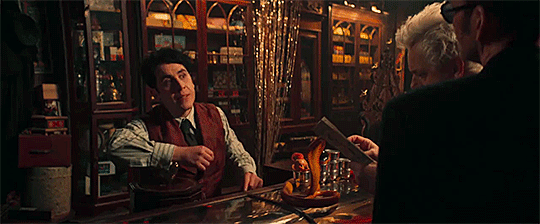
Aziraphale's dry "just aim for my mouth but shoot past my ear," right?
So, how did they figure out that they wouldn't kill each other?
Kingdom of Wessex. 597 AD. The Camelot scene. Crowley and Aziraphale cross paths in the time of King Arthur and are so damn over canceling each other out at work. After Aziraphale rebuffs Crowley's initial proposal of basically quiet quitting Heaven & Hell-- just doing the paperwork and phoning it in-- because he thinks Michael will figure it out (not because he doesn't want to lol), the two part the scene without a resolution... but the 1601 scene provides that resolution for us via the reveal of The Arrangement.
Back in 597 A.D., after the scene we saw, Crowley and Aziraphale got creative in trying to find a solution to their work woes and wound up experimenting with what they had been told by Heaven regarding what their capabilities were. They uncovered that Crowley could still do blessings and Aziraphale could do temptations. So long as they kept pulling power from their respective head offices, it didn't matter what type of miracle they did and no one in Heaven or Hell figured it out. This then caused them to also realize that if they were biologically similar enough to be able to do the same miracles, then odds were high that they actually wouldn't hurt one another if they had more expansive sex and they decided to try it. They're both still here so obviously the end result was nothing but wahoo. What else is suggestive of this besides the already mentioned scenes? This one, in 1941:
Excalibur. King Arthur's sword. Excalibur's Chest. The famous swords-in-the-box magic trick, on sale at Goldstone's in 1941. Swords are as much sexual metaphor as guns. Note what's between them in the magic shop in 1941 when they agree to perform The Bullet Catch together that night, after a performance by The Ladies of Camelot:

This is part of the reason why they also use performing miracles as innuendo-- besides the fact that there is just a lot of material there lol. It's because it took them 556 years after Rome but they happened into figuring out Heaven's big secret and it freed them to boff each other senseless for the last *maths* 1,426 years as of S2 lol so it's kind of irresistible. An example is Aziraphale in S2 with "the 25 Lazari miracle you and I performed together the other night" which is on the surface, sure, about the miracle they did together to protect Gabriel but which Aziraphale makes actually sound like what they got up to the other night, probably the one before Gabriel arrived. He's talking about Muriel there for the Gabriel miracle but he's saying it with a tone of: I suspect that the angel is here to verify the miracle that was Sunday night. I'd imagine alarm bells must have been ringing in Heaven constantly since. You and I raised the damn dead, old serpent...
The Bullet Catch. A sexual metaphor for both "firsts"-- 41 A.D./Rome and 597 A.D./Kingdom of Wessex-- mashed together because they were similar... but also a metaphor for Crowley and Aziraphale's relationship overall.
The Bullet Catch requires them to trust one another and be vulnerable with one another. It's only possible because of how much they trust in and care for one another. Crowley's ability to fire the gun in a way that won't kill Aziraphale-- which Aziraphale is trusting him to do-- means that Crowley has to trust himself to do it. He has to believe himself capable of it and that he can relax enough to do it. He only believes this because Aziraphale believes it about him and makes him feel safe enough to focus. Aziraphale's trust in him allows Crowley to trust both himself and Aziraphale while Aziraphale's trust in Crowley allows him to let Crowley in enough to let him see his insecurities and be loved in spite of them, something Aziraphale's self-doubts and imposter syndrome keep him from doing with other people. Crowley knows he's imperfect and loves him madly anyway, something Aziraphale has trouble doing with himself and which no one else in Heaven ever has. Crowley's faith in and love for Aziraphale give Aziraphale the confidence to live more freely and feel like he's among the professional conjurers and not just on the outside of life. Their trust in one another helps them trust each other and that self-trust opens them up to experiences with each other that lead to ever-deepening trust of one another that lifts them both in a kind of feedback loop.
"Cheers for, um, getting me off the hook." Crowley thanking Aziraphale for helping him with the Mrs. H situation. He's more than aware that Aziraphale assisting with Crowley's broken alcohol bottles when alcohol = sex to them is more than a little metaphorical for their actual history and he chooses a fish reference as part of the thank you. "Cheers" is that British way of saying "thank you" but it's also obviously what people also say as a toast (which is also a word used to refer to warmed bread, which is also related to partnered sex in Ineffable Husbands Speak.) It's what Crowley actually says in 2019 at The Ritz at the end of S1 in the "Cheers. To the world." moment. Here, it's also a reference to the first time they did clink some glasses together in toast-- the "Salutaria" of ancient Rome. And what is this toast-y thank you of Crowley's for? For getting him off-- that is, for getting him "off the hook."

"Off the hook" refers to a caught fish being taken off the hook. It also became, over time, a phrase referring to communication, from the days of phones with cords. Leaving a phone "off the hook" meant that calls couldn't come through and communication couldn't be had. By 1941, the phrase would have roots in both origins and if we're talking about fish and telephones, we're talking about earlier in the evening in 1941 but we're also talking what it referenced to them symbolically about the past of their relationship. It is also absolutely why Aziraphale jumps on The Bullet Catch as his grand gesture once they get to the magic shop-- he sees a way to continue the metaphor that they're both more than aware of.
It also makes it a thousand times funnier then that poor Aziraphale essentially makes the same assumption about demonic life twice over a bazillion years apart. He thought The Bullet Catch would be a no-brainer, fun thing for them to do because he assumed that Crowley had fired a gun before, only to discover that this was now actually Rome all over again because while Aziraphale has a firearms license and a Derringer hidden in a hollowed-out book in the bookshop, this metaphor was suddenly way too on point because Crowley hasn't fired a gun with someone else around before-- in this case, at all, actually. His dry as all fuck "not as such" response to Aziraphale is well, we both know I've fired the metaphorical gun this rifle is standing in for here but yeah, no, I have no idea how to shoot this thing and I was going to miracle you safe and now those aren't working either so I have to do this for real and I'll just be over here trying not to have a panic attack...
Talking. Making sure the telephone is not off the hook is obviously always a good thing with everyone one trusts around them in life. In a relationship context, feeling safe enough to talk openly with your partner about things which make you feel vulnerable is the mark of a trust and what allows for deep intimacy. Talking in bed-- not just checking in with a partner but talking beyond that-- is a therapeutic intervention for anorgasmia, as it helps someone suffering from it to stay present in the moment. Tends to work in general but even more so if the person involved likes chat in bed as a whole, which a couple of scenes suggest Crowley does (the evolution of it into also some extra spicy chat in the "Seeds of Destruction" scene in S1 and his self-deprecating "you just say 'blah blah blah'" moment in S2.)
"We need to talk." What Crowley says in 1.01 when he calls Aziraphale from a corded public pay phone. This is the first time that Crowley and Aziraphale talk in the present, even if they're in separate locations, and the first time we've seen them interact since the opening scene of the show of them on the wall in Eden. We've spent the first part of the 2008 minisode re-introduced to them separately, not yet fully aware of how they were supposed to be together during it. Crowley doesn't wait until he's back in Mayfair after dropping off the antichrist baby-- he calls Aziraphale from the nearest payphone. He says "we need to talk", a phrase that is, for many, a relationship cliche that comes with a sense of the foreboding but we will learn from this scene also means other things to them.
For one thing, it's a code phrase that automatically triggers them to meet the next day at noon at St. James' Park. If one of them calls and says they "need to talk", they know that it means to meet the next day and when and where. This one they know a lot better than their four million alternative rendezvous spots, as we saw in that other scene in S1 when they set up meeting in the bandstand over the phone. Because it triggers St. James' Park, it means that the initial talk will be all coded in their hidden language, as that scene in 1.01 was, but that is also a form of communication for them and a kind that they actually enjoy.
For another thing, it means that they need to talk in general-- that something is happening and they need to talk about it, as was the case with Armageddon. At the time that they have this phone conversation, they don't yet know that one another already knows about Armageddon starting. We know from all the contextual clues we've already looked at here that they were supposed to be having dinner together earlier and that they also can't say that over the phone so when Aziraphale says: "Yes, I rather think we do. I assume this is about....?" there's a dryness to Aziraphale's tone because a form of talking was already on the menu. Sushi night is Rome and Rome had talking so, yeah, Aziraphale rather does think they need to talk-- to fuck-- and also Armageddon just started so they'll need to actually talk-talk about that as well at some point.
Crowley's response to what it's about, though, is destructive sexual metaphor. What do they need to talk about, on all levels, summed up by Crowley in a word?
"Armageddon." Armageddon: the actual end of the world and Armageddon: their big damn anniversary sex. The Big One. It's an apology of sorts for Hell detaining him and a request that they meet tomorrow.
The scene ends with Crowley placing the phone back on the hook-- indicative of understood, secure communication, the likes of which will be on display in the following scenes of the 2008 minisode.
Talking (in Ineffable Husbands Speak). Both verbal communication and physical communication. Talking means speaking. Talking also means making love.
"Trust me." What Aziraphale mouths at Crowley in 1941 to get him to be in the moment enough to be able to fire the gun. Absolutely one of the things Aziraphale said to Crowley to help him relax in Rome.
"I knew you'd come through for me. You always do."

Aziraphale pouring Crowley another glass of wine (and alcohol = sex) and the wordplay kink out here in full force as there are three levels of meaning happening at once. Surface level is about their success with The Bullet Catch earlier in the evening. Aziraphale knew Crowley would come through for him-- "come through" in the sense of he can always rely upon Crowley to be there for him when he needs him to be.
To "come through" something, though, is also to get through to the other side of something-- to have been able to pull through a difficult time or a struggle-- and refers to Crowley always coming out of dark periods and not giving up. But there's really also the third meaning, which is just the direct innuendo:
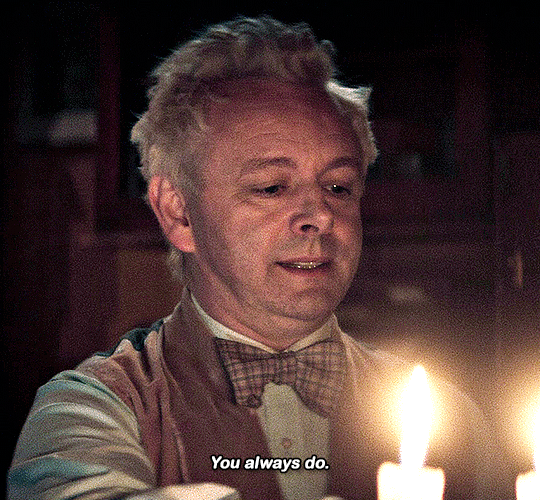
Some serious 'tone of voice' at play in this bit here performing a little magic trick and making that 'through' disappear right out of first sentence lol, turning it into: I knew you'd come for me. You always do.
Aziraphale's never going to stop being thrilled at their Roman triumph here and is still happy to remind Crowley in 1941 that they both know Aziraphale just does it for him.
"Well, you said 'trust me', so..."
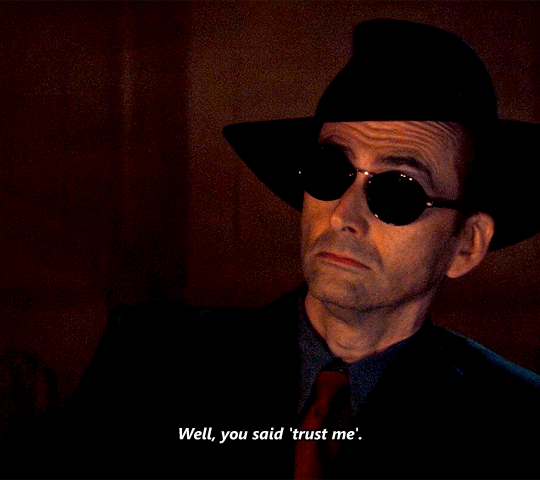
Just prior to this, Aziraphale had been telling Crowley the magic words he silently said to keep the photo of them from Furfur (more fish-- "bananafish").
"Well, you said 'trust me'..." is Crowley saying "well, you said my magic words, so..." Aziraphale invoked Rome and talked to him so he got there.
"And you did." And Crowley did trust him, so it worked.
Aziraphale, though, is not just thinking about earlier that night in that moment in 1941 when he's staring off, reminiscing, before looking at Crowley like that...
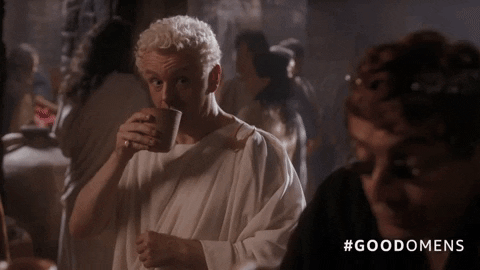
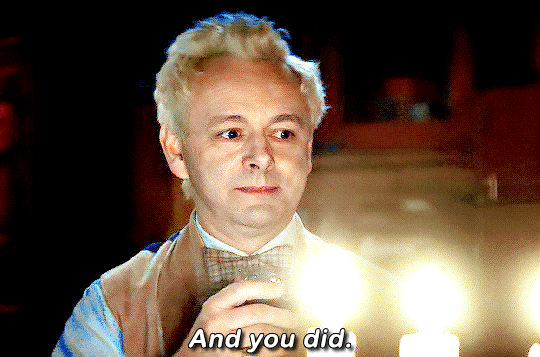
...he's thinking about Rome.
"To drain the whole sea/Get something shiny..." Lyrics from Hozier's "Take Me to Church", pretty uniformly agreed as the most Crowley song that has ever Crowley songed, and which is on his official playlist in S2.
Pearls. The shiny things found in the sea. The jewels harvested from within the opened protective shell left behind by emerged oysters.
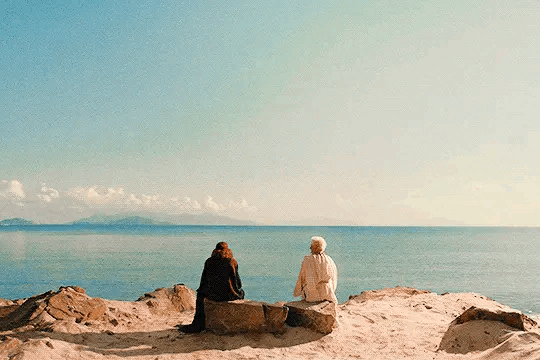
The original post referred to a bit in this one:
#ineffable husbands#ineffable husbands speak#good omens#good omens 2#good omens meta#aziracrow#crowley#aziraphale#spicy omens#tw sa#tw trauma#tw ptsd#crowley x aziraphale#aziraphale x crowley#long meta
186 notes
·
View notes
Text
haven't done this in a longggg while! here's a round-up of some faves I've written over the last few months!
“I Carry Their Experiences In My Heart”: Patrick Abboud On Investigating Australia’s Only Gay Prison - an interview with gay Lebanese-Australian journalist and author Patrick Abboud on his 5-year-long investigation into Australia's only gay prison.
How The ‘Succession’ Finale Takes The Roys Back To The Beginning - explaining how the Succession grand finale paralleled the pilot.
Why ‘The Great’ Is So Great? Because It Feels Australian - analysing how Hulu's The Great is secretly, philosophically, very Australian.
‘Ted Lasso’ Is Officially Out Of Its Depth - explaining how Ted Lasso as a show grossly mishandles the stories of its marginalised characters.
Will White People’s “Didgeridoo” Jokes Ever End? - why I am sick of non-Aboriginal peoples making our sacred instrument into their punchline.
The Wes Anderson Trend And TikTok’s Tendency To Forget About Context - discussing TikTok's culture of context collapse, using the Wes Anderson trend as a case study!
Succession’s Masterful Vibe Check - My review of 'America Decides' and analysis of how 'Succession' generally inspires conflicting empathy and disgust in viewers.
How To Degender Award Shows, According To A Very Serious Non-Binary Person - what it says on the tin. Just me having fun imagining how we could de-gender award shows.
The Strange, Surreal Feeling Of Going About Your Day While The World Crumbles - Explaining what "hyper-normalisation" is and why so many people think they're feeling it right now.
348 notes
·
View notes
Text
Rilla of Ingleside created a new timeline...
Anne's House of Dreams mentioned a historical event - a federal election: “Mistress Blythe, the Liberals are in with a sweeping majority. After eighteen years of Tory mismanagement this down-trodden country is going to have a chance at last.” (AHoD).
From Wikipedia: "The 1896 Canadian federal election was held on June 23, 1896, to elect members of the House of Commons of Canada of the 8th Parliament of Canada. Though the Conservative Party, led by Prime Minister Charles Tupper, won a plurality of the popular vote, the Liberal Party, led by Wilfrid Laurier, won the majority of seats to form the next government. The election ended 18 years of Conservative rule."
It wouldn't be surprsing, but... it was also the year in which Jem Blythe was born! The election took place few weeks after his birth: "When Anne came downstairs again, the Island, as well as all Canada, was in the throes of a campaign preceding a general election." (AHoD).
So... according to this timeline, Walter was born a year later (1897), then the twins (1899), Shirley (1901) and Rilla (1903).
The point is... at the outbreak of the war, Walter would have been only 17 years old, the twins 15, Shirley 13, Rilla 11...
Shirley would have been too young to participate in the war and Walter would have barely turned nineteen at the time of the Battle of Flers-Courcelette in September of 1916...
Someone in one of my older posts noticed that puff sleeves fashion suggested that Anne of Green Gables took place in 1880s rather than 1870s... so it would make sense!
I wonder why Montgomery chose Rilla as her teenage heroine (according to the original chronology, Rilla should have been only 11 years old), while there were 15-year-old twins...
Can you imagine Nan and Di as the main characters of the war book? Two young girls at Queen's, trying to come to terms with rapidly changing world? Rilla and Shirley at Ingleside, growing closer in such trying times? Teenage boys - Jem and Walter - who had to choose if they wanted to sacrifice their life at even younger age - at eighteen? Walter, never reaching the age of twenty (or maybe - dare I hope - coming back home safely)? Anne and Gilbert in their 40s, trying to collect all the broken pieces that was once their family?
It would have been equally good, in my opinion. I wonder... why Montgomery felt she had to suddenly change a whole chronology?
Side note: of course, I love Rilla of Ingleside. But I am just curious... (Nan and Di of Ingleside would be a good book, too!).
@diario-de-gilbert-blythe @gogandmagog @pinkenamelheart @valancystirling48
64 notes
·
View notes
Text




okay so basically:

thanks for your 100% unprompted and completely unsolicited enthusiasm everyone >:) god i am NOT doing any full essays because i am forcing myself to hold back on committing to Positions wrt tmuir's various intertexts until after alecto when i have an actually complete narrative to work with, but, to throw together my best effort at an abstract: as we probably know and as many have pointed out before (and as tmuir says in the gtn notes), the name 'dulcinea' references cervantes' dulcinea del toboso, a wholly made up woman whom don quixote projects onto a peasant girl called aldonsa as a necessary 'lady' to his own invented 'knight.' the essential premise of don quixote, put crudely, is that the title character reads an absurd amount of chivalric literature such that he imagines himself to be a knight errant and behaves as such in a period long after the social logics of chivalry make coherent sense; sharp contrasts between idealism and realism (as with the infamous tilting at windmills scene, for example) serve to drive home the absurdity of don quixote’s pretense. within this, the imagined dulcinea del toboso stands as a necessary element to the chivalric ideal that don quixote imagines himself to participate in; the knight’s ‘lady,’ as fictive as the knight himself, must be ‘sweet’ (as of course denoted by her name), of a high social class, genteel, and beautiful according to ideals of upper-class spanish beauty (blonde, pale skin, etc—of course in-text exaggerated to a comic degree). all of this, ofc, tells us something about the social allegiances of the chivalric world.
crucially, don quixote was written in the early 17th century, with the first part being published in 1605 and the second in 1615. the reconquista—the process by which christians took control of the iberian peninsula from its previously muslim rulers—was concluded in 1492, with expulsions and forcible conversions of muslim and jewish populations taking place between 1492 and 1526 and creating a new class of ‘converso’ or new christians, ie. former jews who converted to christianity but lived with a degree of suspicion cast over the legitimacy of their christian practice. (incidentally, a handful of scholars have theorised that miguel de cervantes’ family were converso jews, which i think casts a fun new light on don quixote, but the evidence is too flimsy to justify seriously committing to the reading). immediately following the reconquista was the establishment and expansion of the spanish empire, which by cervantes’ lifetime had grown to cover most of the americas and the philippines. spanish chivalry was articulated via the knightly orders carrying out such a process of christian conquest—first on the iberian peninsula, then exported to the so-called ‘new world.’ by the time cervantes was writing, chivalry had already reached its apex and was in a period of decline; as i’ve already said, the fulcrum of don quixote is this tension between the ideal and the real, this sense that don quixote’s perception of the world is no longer compatible with modernity. cervantes writes of a christian ideal at a time when aspersions were cast on conversos, where the distinction between ‘old’ and ‘new’ christians and fear of the persistence of judaism (and islam, though muslims who were forcibly converted were expelled outright) against persecution undercut this understanding of forcible conversion as a ‘success’ for christianity; far from writing about the ‘old order’ (if you will) with a straightforward elegiac nostalgia, he emphasises its illegibility in the modern period.
as i’ve talked about before, chivalry bears a relationship both to historical periods of christian conquest and subjugation of so-termed ‘infidel’ groups and to contemporary fascist aesthetics, and also holds currency in contemporary articulations of butchness/transmasculinity/queer masculinity/etc. wherein those relationships tend to be elided. one of tamsyn muir’s most prominent registers is the persistent usage of similar such touchstones: from chivalry [via cavalierhood] as a language by which lesbian articulations of desire become possible (cf., obviously, gideon/cytherea, and the ‘medieval’ aesthetics of the seventh house in general) but also as a hegemonic touchstone of an imperialist social formation to jeannemary’s having been named for jeanne d’arc to lyctors as a reference to lictors ie. roman bodyguards who carried fasces in what could plausibly be gesturing to the etymological root of ‘fascism,’ she’s v clearly working with the tensions present in these cultural building-blocks that can be used to construct an empire around the bedrock of catholicism & antiquity and to situate queerness (largely focalising lesbianism) comfortably within it.
so, like—what’s the don quixote thing doing? like, why reference a picaresque from the 17th century, rather than an ‘actual’ chivalric romance?
there’s a fairly straightforward, surface-level reading to be done here: the crucial dimension of pretense and artifice that cervantes adds to don quixote’s ‘knighthood’ maps pretty clearly onto gideon, and dulcinea as a woman who is very much Not Real but in fact a ‘disguise’ formed around what she ‘ought’ to be maps equally well onto cytherea. & ofc, cytherea and gideon’s relationship as this process of seduction-inclulcation-tutelage by which gideon ‘learns’ cavalierhood similar to how don quixote’s artifice of knighthood depends upon the presence of dulcinea of toboso in order to make sense of itself; knight-gender (if u will) as relational. much like how the driving tension of don quixote comes in part from our asking, does don quixote realise his own pretense? does his calling himself a knight and behaving as though he were a knight make him a knight in a world where the relation he tries to invoke makes no social sense & he has to literally alter the world around him (windmills into giants, aldonsa into dulcinea) to make it coherent? at what point does gideon not ‘really’ being a cavalier stop mattering, and how much is cytherea facilitating that, and how much is their relationship doubling as an inculcation into a social relation to which she was previously only peripheral? and, obviously, what does the fact that their relationship is pretty transparently predatory tell us about the relationship muir tries to draw between socially sanctioned exploitative relationships, imperialism, sexual violence and its aestheticisation, &c. &c.?
BUT LIKE….i think you can take the reading a bit further and think about the fairly common interpretation of dulcinea of toboso as something of a stand-in for, or else a counterpart to, allegiance to the spanish empire; that a feminised ideal of empire becomes the ‘lady’ to the (arguably conquistadore) knight, and that don quixote’s allegiance to her in turn becomes an allegiance to empire & imperial conquest. & ofc, the falsity of all of this; how ‘idealism vs realism’ then becomes transformed into an ideal of empire vs its reality. what gendered formations are made possible by empire, etc.
i also think you can draw some lines around the shifting balance of power between don quixote & dulcinea of toboso and gideon & cytherea; that don quixote ‘makes’ dulcinea out of aldonsa, but cytherea very much ‘makes’ herself into dulcinea (using a real woman whose identity she stole as a very loose proxy); that cytherea sits in an ambivalent position wherein she at once, unambiguously, holds power over gideon that she exploits (socially, sexually), but also occupies a position of subjectivity not shared by eg. mercy, augustine, gideon the first &c. via her blood cancer & the eugenicist practices of the seventh house; cytherea as a character who seeks power where she has the ability to seek it as an ineffective means of responding to the sites where she finds herself powerless—a trait she v much shares with john gaius, but not with mercy et al.! this ambivalence is best expressed through the relation that naming & renaming & remaking bear to one another in the wider text, which, as we well know, is used as a particular discursive expression of ownership tugging on thematic strings around sexual violence and empire (alecto into annabel; i am deliberately not doing nona spoilers in this post but redacted into redacted as well; you know the drill!); cytherea undergoing that process of obfuscation and recreation at her own behest & at once becoming subject and instigator, invisibilising the ‘real’ dulcinea in doing so & removing the external agent (gideon as don quixote) from the equation … it’s doing a lot of work around the ambivalences of power & agency (sexual and otherwise) happening there! and, of course, ask other questions about, like—as ‘dulcinea’ is an agent in the process of gideon occupying that don quixote-equivalent position, does she not then become a similar agent in cytherea’s occupying the ‘dulcinea’ position—does the relational configuration not go both ways—how much of cytherea, who we receive through gideon’s close third, is her fantasy/idealism/etc. and how much of it is cytherea’s own construction? like, is gideon actually removed from the equation? chicken-egg?
there’s a whole separate argument to be done here as well around palamedes & the ‘actual’ dulcinea/dulcie, and what this invoked projection of an imagined ideal onto a very real woman could do for a more compelling reading of their relationship than just … like, oh he was in love with her, it’s unrequited, sad! well i guess he’s just blown himself up in cytherea’s sickroom. i’m interested in these little undeveloped tendrils of, like … dulcie as a character completely and unequivocally removed from the narrative in gtn, only to establish her own presence in htn but even then only really be made sense of in relation to cytherea (i think All The Time about dulcie wearing predominantly white and cytherea wearing predominantly green … girl help they swapped colours), palamedes as being, iirc, pretty significantly younger than her … and then the fact that you could pretty easily make a case for palamedes’ name being a reference to the palamedes/palomides of the arthurian canon, a ‘saracen’ knight and convert to christianity, what that dimension can do to these readings of tmuir’s invocation of chivalry as a particular social dimension to conquest.
this is all very very roughly sketched out and if i were to ever actually try and pitch a take that wasn’t just a quickly glossed few paragraphs on tumblr dotcom i would absolutely be delving properly into the scholarship around don quixote such that i could produce something somewhat less hamfisted than All This, but. hopefully this gives the broad gist of it, lol!
484 notes
·
View notes
Text
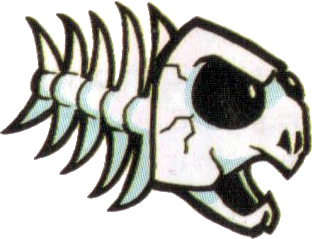
Name: Honebon
Debut: Super Mario Land 2: 6 Golden Coins
The year is 1992, and Nintendo is making a hit sequel to the video game Super Mario Land for the Nintendo Game Boy. The previous two games in the Super Mario series, Super Mario Land and Super Mario World were both massive hits, and if you know anything about video games, it's obvious why: both had Skeletal Fish Enemies!
If Super Mario Land 2 was to have a chance of succeeding at all, they'd have to include a Skeletal Fish Enemy. But they couldn't just bring back Honen or Fish Bone, no. It was the '90s! We needed a hip, new skeletal fish for Cool Teens!
And so, Honebon was born! Isn't the miracle of childbirth amazing? Unfortunately, Honebon was born a skeleton, which is always a bad sign, because as it turns out, Honebon was dead on arrival...
Now don't get me wrong, Honebon has a few distinct traits to separate it from its Skeletal Siblings. Its attack pattern is unique, since it moves in a zigzag shape instead of a straight line, and according to Perfect Ban Mario Character Daijiten, while Fish Bone is the type to hold a grudge, Honebon has an amiable disposition! So if you're ever looking to befriend a skeletal fish, let that be your guide!
I also think Honebon's name is really funny. It's a portmanteau of hone, the Japanese word for "bone," and the English word "bone". And despite the fact its name doubles down on this being a skeleton, all the official material seems to describe it as a Cheep Cheep's gh-gh-gh-ghost!
But even with all of that, it's clear that Honebon's story as a Mario enemy ended as soon as it began. Honebon was competing for a niche that had already been filled multiple times over. It's a real Spike Eel situation over here! Clearly, Mario games didn't need any more skeletal fish enemies...

Name: Jean de Fillet
Debut: Super Mario World 2: Yoshi's Island
But just because they didn't need another, that doesn't mean they didn't want another! I mean, come on! None of the previous skeletal fish had names that were dated pop culture references, so clearly there was an untapped market there!
You think there wouldn't be much ground to cover with another skeletal fish enemy... and you would be right! There is not all that much unique about Jean de Fillet. Much like Fish Bone and Honebon, it is described as a skeletal Cheep Cheep, despite none of the three really having Cheep Cheep anatomy at all, and much like Honen, its attack pattern involves jumping up to attack Yoshi. They can swim through lava I guess, but I'm not really convinced the other skeletal fish can't do that.
You see what happened? They ran the well dry, and all the fish that were living in the well for some reason died. Nintendo was just left with a bunch of fish skeletons, and all they could do at that point was put them in Yoshi's Island! Sad! Many such cases.
But due to Yoshi's Island going on to become a whole series of its own, Jean de Fillet would have a little more staying power than Honen or Honebon. Which is to say it appeared in Yoshi's New Island, where it even gets a boss variant named Furious Fred de Fillet!

Now it's kind of debatable whether or not Yoshi's Island is mainline, but if you include it, that's four mainline entries in a row that each introduced a completely new skeletal fish enemy! Super Mario Land and Super Mario World both did it, and so would their sequels.
Did this madness ever end?!
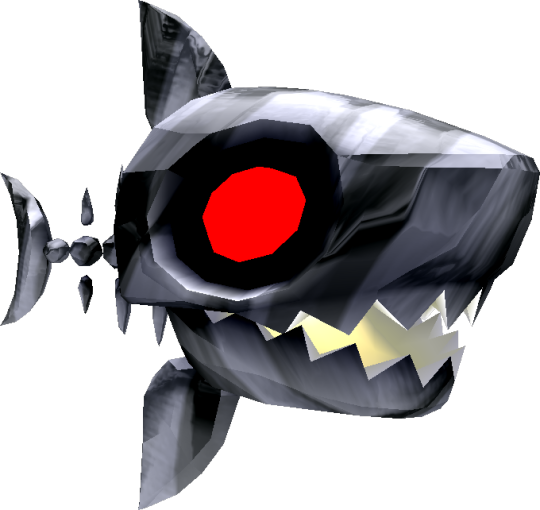
Name: Bonefin
Debut: Super Mario Galaxy
Not before they could sneak in just one more skeletal fish enemy! It had been over a decade since Jean de Fillet, and in that time it had become the future! That meant their next skeletal fish had to be made of metal. Everything is chrome in the future! (Reference to "Bob")
And since they had a whole new dimension to play with, we were no longer starved of unique attack patterns! Bonefins lock onto Mario, and charge in that direction until they either hit him or hit a wall and explode. (Reference to "Bob")

Bonefins solely appear in the Bonefin Galaxy. They serve as mooks to Kingfin, a giant Bonefin that appears to be actually made of bone! This boss fight is kinda all that exists in Bonefin Galaxy, but at least they got a whole galaxy to themselves, right?

This would mark the end of an era however, as when Super Mario Galaxy 2 rolled around, there was no new skeletal fish enemy to be seen. In fact, Bonefin would only cameo as a skeleton, which is obviously and very intentionally meant to represent the fact that regular new skeletal fish enemies are a thing of the past, a product of a bygone age...
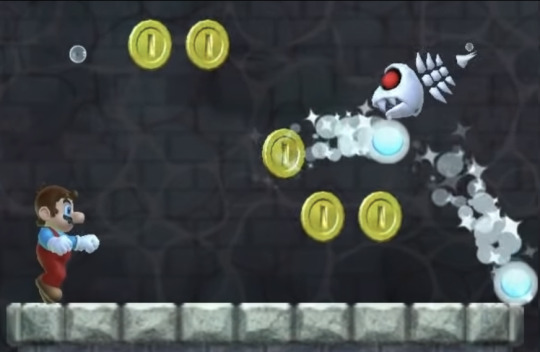
Since then, the series has standardized Fish Bone as their skeletal fish of choice, as they made their grand return in New Super Mario Bros. Wii and have been a series staple ever since. In the process, however, they gained Bonefin's homing attack, letting them do a little more than be Cheep Cheeps for ghost houses and castles!
Is the lack of new skeletal fish enemies another disappointing example of Mario Homogenization? Or did they make the right call, picking a skeletal fish and sticking to it? I dunno. I am completely neutral towards this development.
#honebon#jean de fillet#furious fred de fillet#bonefin#kingfin#super mario land 2#yoshi's island#super mario galaxy#mario#weird mario enemies#mod hooligon
146 notes
·
View notes
Text
I've had this one floating in my head for a while
Hazbin Hotel character songs (musical theatre edition)
Charlie- Defying Gravity (Wicked)
Vaggie- No Good Deed (Wicked)
Alastor- But The World Goes Round (Cabaret)
Angel Dust- Noel's Lament (Ride The Cyclone)
Husk- The Oldest Established (Guys and Dolls)
Nifty- I Can Do That (A Chorus Line)
Sir Pentious- When You're Evil (Voltaire)
Vox- The Art of the Possible (Evita)
Valentino- El Tango De Roxanne (Moulin Rouge!)
Velvette- The World According to Chris (Carrie)
Lucifer- Corner of the Sky (Pippin)
60 notes
·
View notes
Text
The Animated Series' weird takes on Trek history deep dive!
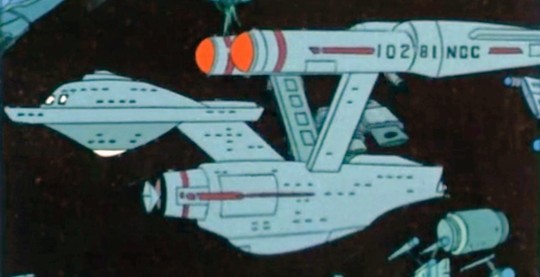
Check out S.S. Bonaventure 10281NCC from "The Time Trap", according to Scotty "the first ship to have warp drive installed"
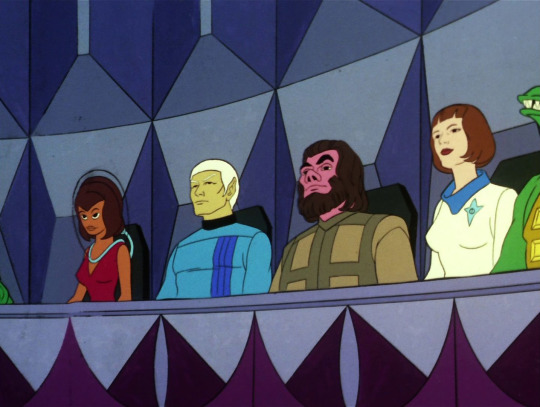
Among the council we see a woman in a white Starfleet TOS-ish uniform with blue collar and a science insignia, presumably a surviving crewmember.
TAS is weird because it was out of continuity during the 90's, due to Filmation's bankruptcy and subsequent rights issues and Gene Roddenberry's supposed dislike of it. As a result, episodes and novels were forbidden from referencing it even if a few were snuck in regardless and subsequent Treks took things in different directions.
Now in 1993 the Star Trek Chronology was released, largely ignoring TAS. It featured this same named ship, which subsequently made it into a Deep Space Nine episode via this graphic:
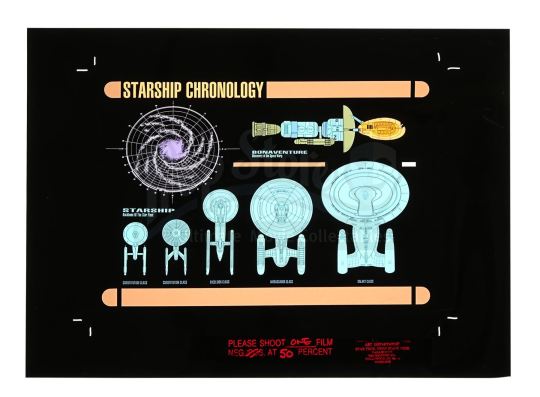
And this Bonaventure design would be inspiration for the Phoenix in the movie First Contact

So how does TAS' Bonaventure fit now? Ummmm not so well. Fans speculated she was the first ship to have a Dilithium powered warp drive... until Star Trek: Enterprise nuked that. And then TAS nuked itself on those details a little later...
April's Enterprise
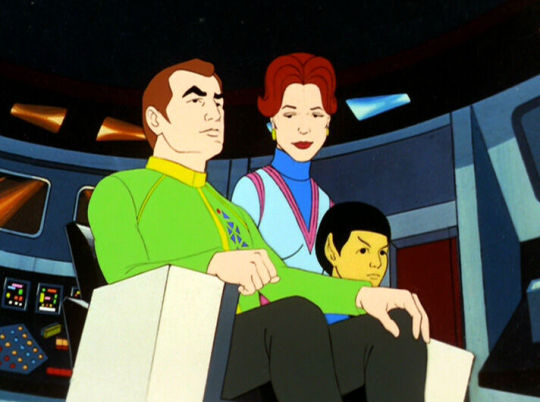
"The Counter-Clock Incident" is the first time we meet Robert April and his wife Sarah. Robert April was an early name, eventually changed to Christopher Pike for the 1st pilot episode of live action Star Trek and eventually James Kirk for the original series proper. Then retroactively made into different characters who commanded the Enterprise prior to Kirk.
Sarah comes out with "As the first medical officer aboard a ship with warp drive..." which is problematic to say the least.
TAS seems to imagine a universe where Bonaventure 10281NCC was launched shortly before the Enterprise, and warp drive and everything are all very new. The Star Trek Chronology and then the Enterprise series would move things back considerably, giving us the warp-powered Enterprise NX-01 with Dr. Phlox a century before Kirk's time.
Spock and the Enterprise's age
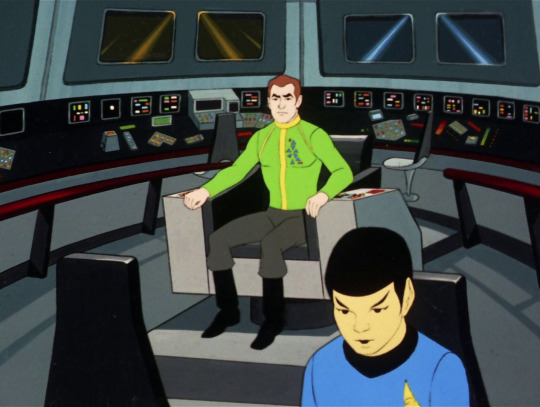
In "Counter-Clock Incident", weird stuff happens and the crew are in a bizarre reverse universe where they age backwards. April begins as a 75 year old man heading to mandatory retirement, but as everyone de-ages he ends up a young man looking much like Jim Kirk. At that time, everyone else is a toddler. Spock lasts longer though, and is still functional on the bridge as a teenager until the last few moments. This implies Spock is the oldest by far of the TOS crew, which makes sense due to the long lifespans of Vulcans. However, beginning with that 1993 Chronology book and made official in Star Trek Beyond, Spock is only 3 years older than Jim, born 2230 and 2233 respectively.
And how old does this make the U.S.S. Enterprise NCC-1701? This goes all the way back to The Making of Star Trek, which supposed the vessel is 40 years old at the time of TOS - something modern Trek would cut roughly in half. Strange New Worlds makes official her launch year as 2245, when Jim Kirk was 12 and Spock 15 (and in the Kelvin Universe, the Enterprise is launched much later in 2258 under Pike, but that's explicitly an AU where everything post 2233 is different)
The Man-Kzin Wars
I wrote a whole thing about the Kzinti in Trek here:
In Larry Niven's Known Space novel universe, the Kzinti were defeated when humans invented faster-than-light travel. In the 1970's, long before Star Trek First Contact, Star Trek Enterprise or the official Chronology book, I'd guess the 4 Man-Kzin Wars took place much as in Known Space, warp drive made the difference. But what does Sulu say?
"The Kzinti fought four wars with humankind and lost all of them. The last one was two hundred years ago..."
So despite "The Counter-Clock Incident" implying 40 years ago for warp drive and "The Time Trap" giving us a first ship with warp drive looking much like the TAS Enterprise implying it's not that old, now it's 200 years ago. Which in modern Trek would be around the time of Star Trek First Contact. I have a headache.
So in summery, TAS is amazing and it's continuity is utterly flawless and it's everything else made since that's wrong even when TAS clearly wasn't paying attention to what it itself had established.
#star trek#deep dive#star trek the animated series#star trek the original series#deep lore#star trek chronology#star trek books#robert april#spock
98 notes
·
View notes
Text
Highwayman According to De's Characters
I was a highwayman

Along the coach roads I did ride
With sword and pistol by my side
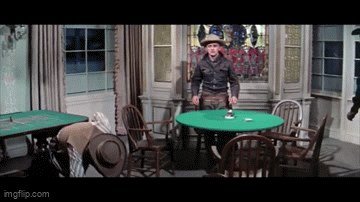
Many a young maid lost her baubles to my trade
Many a soldier shed his lifeblood on my blade
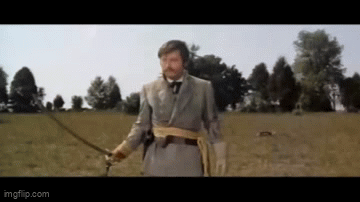
The bastards hung me in the spring of '25
But I am still alive

I was a sailor

I was born upon the tide
With the sea I did abide

I sailed a schooner 'round the Horn to Mexico
I went aloft to furl the mainsail in a blow
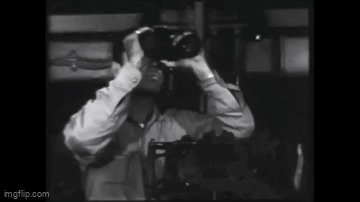
And when the yards broke off they said that I got killed
But I am living still
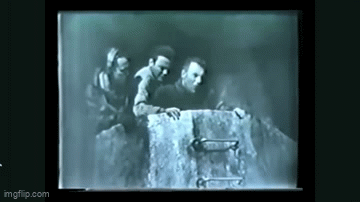
I was a dam builder
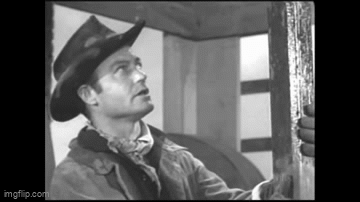
Across the river deep and wide
Where steel and water did collide

A place called Boulder on the wild Colorado
I slipped and fell into the wet concrete below
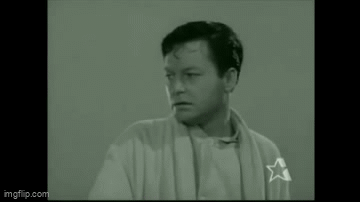
They buried me in that great tomb that knows no sound
But I am still around
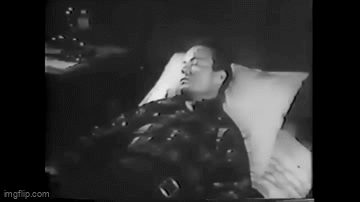
I'll always be around, and around and around
And around and around and around and around
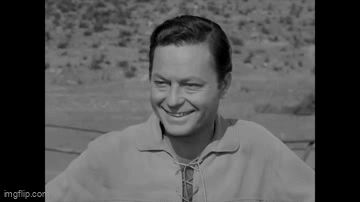
I'll fly a starship

Across the Universe divide
And when I reach the other side
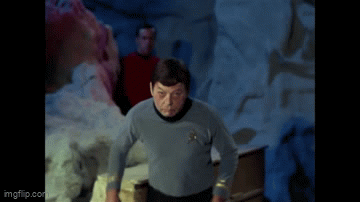
I'll find a place to rest my spirit if I can
Perhaps I may become a highwayman again
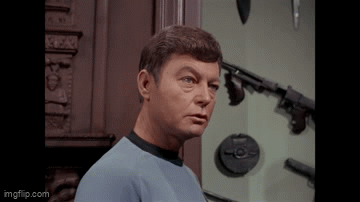
Or I may simply be a single drop of rain
But I will remain
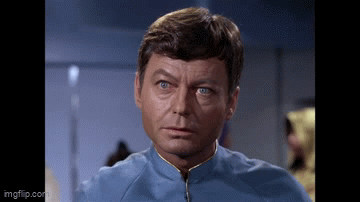
And I'll come back again, and again
And again and again and again and again
And again

#deforest kelley#the world according to de's characters#the highwayman#the highwaymen#mackenzies raiders#warlock#raintree county#bat masterson#time to kill#navy log#silent service#studio one#you are there#the virginian#the lone wolf#frozen escape#death valley days#search for spock#city on the edge of forever#a piece of the action#journey to babel#the undiscovered country
45 notes
·
View notes
Text
Fighter Breakdown Tracker, episode 3x78
Welcome to what was originally an opportunity to talk about the myriad wizards (not Myriad wizards, a separate concept) of Campaign 2 that occasionally gets co-opted into other things when the thought arises. Anyway, obviously the main event was the Barbarian Breakdown and, relatedly, the Party Breakdown, due to their Communication Breakdown, giving Allura Vysoren specifically her 19th Nervous Breakdown, but I've already talked a lot about Ashton. How are the fighters doing?
As a reminder: characters are included on the basis of 1. are they a fighter, 2. are they remotely relevant to this campaign, and 3. do I have something funny to say about them. I cannot stress enough how important item 3 is in the decision process; do not make requests, my muse speaks to me and that is how the characters (and, to be honest, classes) are chosen.
Cassandra de Rolo: Yes! According to the Tal'Dorei Campaign Setting (not reborn) she's multiclassed into fighter! Anyway that plan to go to the ziggurat went well, huh? totally normal and great. I like to think that due to her rogue levels she saw Fearne march down the ziggurat steps and just peaced out and has been chilling in Pike's little cabin ever since. 4/10: normal "is the world ending" concerns but otherwise she's having maybe the best day anyone on the Whitestone War Council can.
Jarett Howarth: he's specifically avoiding Bells Hells because motherfuckers keep teleporting from Marquet and not bringing any fusaka. This, plus normal "putting the Pale Guard on a war footing and also there's a really mad goat lady in the garden" bumps him up to a 6/10.
Orym: my serious thoughts about the space made for Chetney, FCG, and Imogen to step up aside I honestly think the semi-joking narrative of Orym going off in a huff and working out his feelings quite literally via the power of elaborate bodyweight calisthenics of the sort that grant you 20 Dex and 10 Str would be good for him. Allow yourself a little pettiness, Orym; it's good for the soul. 5/10 because I don't fucking know; we'll see next game.
Ariks Eshteross: I hope he's at peace and buried next to his love as requested; I still haven't gotten around to making those cookies actually and frankly I've had much more of an eye on the gunpowder tea shortbread. 0/10; I like to think he has found true rest.
Bertrand Bell: These motherfuckers have not visited the grave of their namesake at ALL. Traipsing around the Raven Queen's temple - literally everyone but Laudna and FCG has wandered over to that corner of the city - and NO ONE has taken a moment to pause and reflect. He died as he lived: everyone kind of setting him aside for more important matters except for followers of the Raven Queen. 8/10 because hopefully he was entertained by the raven show that got put on but also, come on man you couldn't stop by at all?
FRIDA: I have to imagine things in Vasselheim are wild and it's going to be missing FCG hours, but at least they're in great company! 5/10; they're a pretty even-keeled robot all things considered but the situation is pretty tense.
Otohan Thull: My sole regret about how great this episode is and the fact that we're dropping into the Fey Realm for a bit to have some much-needed time to regroup is that we are likely delaying their richly deserved demise. Anyway everyone's beloathed Palpatine knockoff is unfortunately super unflappable; another reason why they are boring as shit and why I very much want Bells Hells to make the bridge a little bit bloodier on the way up. 3/10.
Percival Friedrickstein von Musel Klossowski de Rolo III: Here's the thing. All things considered, his personal position is stressful, but not terrible. The ziggurat did not blow up; Gwen appears to either have not told him about her Delilah incident or did so in such a way that he didn't realize what was going on; he doesn't seem to have noticed the break-in into his parents' bedroom yet; Allura was reassuring re: Whitestone likely being safe (although...it's on a ley nexus so watch out!); and he got to deliver the line "ever since I met you, I knew you were destined for stupidity" which is actually how he specifically blows off steam. On the other hand, every single window in the castle has been destroyed, Allura had to leave, and I just checked and confirmed that Pike does not have the mending cantrip. Maybe one of the local clerics does? Maybe one of his kids does? Maybe Vilya or Ebenold does? Maybe Grog's in town and can be convinced that the role of the Grand Poobah etc etc is fixing windows? 6/10.
#d&d class breakdown tracker#(the new generic tag no one asked for but i need)#critical role#critical role spoilers
98 notes
·
View notes
Text
I hope you all will allow me this post on Pedrenzo day. It won't be as well sourced as the previous ones, but I think we deserve a chronology.
Pre-World championship.
They meet for the first time at the CEV (2000), but they have know about each other before that. They are both close to age (19 months) and both were pretty small. At this point, they use the other rider as a reference more than as a rival as they both are fighting against people older and more experience than them with the handicap of their age and height.
In 125cc (2002 and 2003)
During this period of time, their rivalry started, but it was pretty tame. It's also important to note that it was mostly external factors that started it rather than the riders itself. Dani was racing for Telefonica/Movistar and Jorge for Caja Madrid/Fortuna), which made them two very young rider, with lots of talent and pretty promising, in Spanish teams. Their teams weren't friendly against each other, and their manager also used to be rivals.
All of it, made the riders feel like they had to beat the other in the track at all cost. it got to the point on wanting to know the other's position to see if they have placed higher.
We also had their characters component, that is something that will follow them their whole life. Dani is quite and calm. He does things behind close doors and the talking on the track. Where Jorge is loud, very loud, and he uses the media and does the talking in the open.
They also had 0 contact outside track between them, not even a 'hi' when meeting at the paddock.
In 250cc (2005)
In here their 125cc rivalry is intensify. Dani was already 2 times World Champion and Jorge had still to prove himself. Dani was the dominant force to beat and Jorge wanted to be the one to do that. There was also the talking everyone did on the media, that fueled their rivalry. Everyone was accusing everyone of doing things. (mostly Puig, Amatriaín and Jorge).
In this year, the thing between them got much worse as they made contact on track several times. Germany is mentioned as the time that set everything into flames, but Catalunya was the turning point. Due to his excess of aggressiveness (and probably unconsciousness and stupidity), Jorge got a race ban (Malaysia 2005) after he made contact at the Japanese GP with De Angelis and Dani. Jorge used to blame Dani for that because instead of helping him, Dani took out all the receipts of the contact they made on track, which was the nail in Jorge's coffin according to Lorenzo.
Older Jorge will admit he deserved it and that it was a turning point for him.
It's during this time when Dani refused to say Jorge's name or mention him (Germany 2005 forward), which pissed Jorge. And I think it still pisses him to some extend.
So by the time Dani moved to MotoGP, they were at each other's throats, specially with the media, and with Dani as a 3 times Word Champion and Jorge still needing to prove himself.
MotoGP
When Jorge made it to MotoGP, media expected them pick their rivalry where they left it, and it kind of did with the Qatar incident. In that Grand Prix Dani didn't congratulate Jorge after a good result, and it pissed Jorge. Years later we learn it was due to an injury. However, it put them in the 'not speaking' terms and labelled as bitter rivals.
The following Grand Prix, the ex-King of Spain (Juan Carlos I), who is a fan of racing, tried to show they get along and it was just a misunderstanding made them shake hands at the pre-podium.
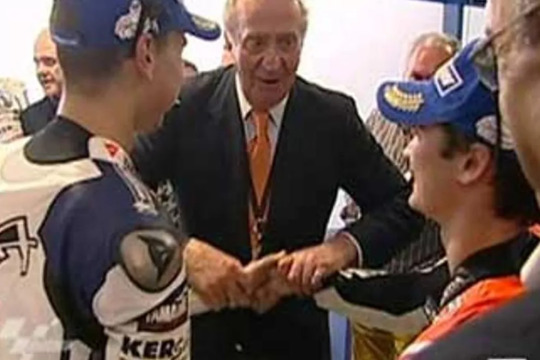
Instead of cleaning the air in between them or cleaining their image it made it all worse. It looked like they couldn't be in the same room if they weren't forced to share the space.
On track they keep fighting hard against each other, more cleanly this time, and still with the same mentality as in 125cc and 250cc. If I can't win because there are other riders doing/having a better day than me, at least I have to beat Dani/Jorge.
Allegedly, 2008 was the worse point in their rivalry, but when asked them directly, they was the period of time between 2008-2010. Their rivalry got to that point it split the whole country. People were genuinely asking if you were Team Dani or Team Jorge. There are still videos of young Spanish riders having to choose (the Márquez used to be die hard Dani fans and Rins was team Jorge all the way).
Little by little, after fighting so much and for so long against each other, and sharing so many space and podiums together, their relationship moved from bitter rivals, to just rivals, to the rival I respect. Dani said that for him the big change was 2012, when their championship fight was the closes. Dani realized that he had been fighting his whole life with Jorge, therefore, they are as good as the other. Their rivalry had made them grown as riders because they had to outsmart and be better on track than the other, so it was a hats off moment.
In 2012 we also had the first physical approach between them. It was also in Qatar when they hugged for the first time, and it was a symbol of them finally burying the hatchet.

2012 also gave us the iconic marriage proposal (please watch the whole video, it explains Pedrenzo rivalry up to 2012).
From then on, their relationship improved a lot. It could also be that they both had change their managers by 2013, so part of what it set their rivalry wasn't in the equation anymore. They also had grown from kids to adults!
In 2015 Dani invited Jorge to Sete Gibernau's (ex-ride, and Dani's friend and coach) 'ranch'/track for a training weekend among other riders. Jorge ended up getting injured, and Dani went out of his way to check on him because Jorge was fighting for the championship. He got injured in the collarbone and Jorge himself admitted it was dumb because he just wanted to win against Dani when racing with smaller bikes. Apparently Pedrosa was miles faster than any other riders (Rins was there and I think the Espargarós too are mentiones
In 2018, when it was announced that Jorge was moving from Ducati to Honda and was going to replace Dani, Jorge tried to convince Pedrosa to stay in the championship by switching to the Petrona's team. It was pretty public with Jorge saying how a much smoother bike will suit Dani's riding style. Ultimately, Dani decided he didn't want to break anymore bones or suffer, so he retired.

Jorge and Dani exchanging helmets at the end of the 2018 season
After MotoGP
Now they have a pretty good relationship. They can be in the same room and laugh and talk for hours about racing, including their 250cc races. Jorge will be the one pulling all the monts and remembering the weirdest stuff and Dani will look bamboozled because he doesn't remember that. In fact, among all DAZN's pundits, Jorge is the one that makes Dani smile and talk the most.
They're pretty quick to mention the other rider when possible (specially Jorge), and they are pretty open when asked about their battles in and out of the track. In fact Jorge will jump at any opportunity to mention and praise Dani. Dani will need a bit more of coaxing, but he will also talk and praise Jorge.
Now that the know parts are about, I want to share some thought I have about them.
I think this imatge basically summarizes their relationship. And creditto Jorge Lorenzo himself for putting it together.
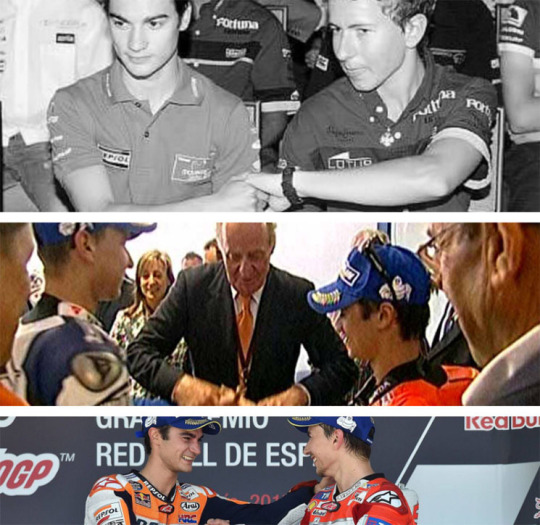
First photo is pretty early in their relationship. You can see that they aren't interested in each other. It's basically a photo for the media.
The middle one is Jerez 2008 and you can see how forced their handshake is. The king gets the wrong hand, and all of them are confused and wants to be done with it.
And the last one, it's more than a handshake. They are truly happy and comfortable around the other. They want it.
Waru's thoughts
I think young Jorge was really mad at Dani and wanted to win Dani no matter what due to the different way they got into the championship. All red tapes were broken for Dani. His ages was overlooked when he entered the Movistar Cup, when Jorge had to wait until he was 15 to make his debut.
Dani had Puig who saw him and decided to bring him to the top, despite not meeting the criteria that was set, while Jorge had to fight and crawl all his way up. Yes Jorge got a manager and his dad, but he also had to prove himself over and over while Dani could flop and Puig would have still been at his side.
It's also the relationship between Dani and his dad. Antonio was there to guide and support Dani, but at the end of the day it was Dani who took the decision, while Jorge didn't have a great relationship with his dad. Chicho acted more as a coach than a dad.
And then when Dani got the 125cc tittle, he got the ColaCao add, that made him look as the good boy that hasn't broken anything, while Jorge had the bad boy label. Dani had everything he wanted, DORNA's approval as he has come thought a DORNA's approved championship, a good relationship with his dad, a great mentor and a team behind. Basically it could be seen as DORNA had picked Dani to be the next Spanish winner at the big category (see why I translated Elegido para ganar as handpicked to win?) and instead, Jorge was the one who did it.
So yes, I think Jorge saw Dani having everything he had fighter for, and not having had to fight as hard as hi. So apart of all the things mentioned above, I think there was a bit of jealousy involved too. But well this is what I think, I might be wrong, but the way Jorge reacts when the ColaCao add is mentioned is prove that there was more there.
And here is all the chronology. If you think I forgot anything let me know! Also feel free to add things if you want.
#MotoGP#250cc#125cc#Dani Pedrosa#Jorge Lorenzo#Pedrenzo#Pedrenzo Chronology#DaniLoveFest2024#DaniLoveFest#ummm didn't I write a similar post recently?#For this reason I think Permín is so Pedrenzo coded there are so many parallels
33 notes
·
View notes
Text
Crying blood, bleeding tears
tw mention of su!c!de, angst, no comfort, character death, demon slayer AU
character scaramouche/F!reader
a/n i really enjoyed writing thiss!! the angst in this- i was surprised when i reread this. "did i write this? holy-" haha
happy reading though! or considering it's angst- probably not happy reading...
this one-shot is a bit long.. 2308 words to be exact.. sorry about that :,3 it's also on my ao3!!
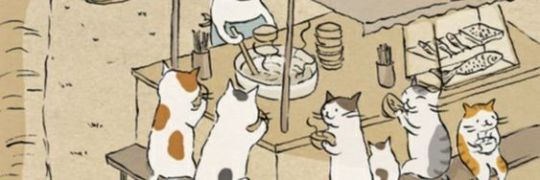
The way you spoke to people, how you use your hands in conversations, how you always care for people even if they have bad intentions for you. The way you look at him, like he's the only person in the world that matters to you. If he was dared to tell the whole world he loves you, he would simply whisper it in your ear.
Out of all the hashira's, you're a rank higher than him, but he is still well respected, even though his personality is shi-ty. Most of the members of the Demon Slayer Corps know him for how strong he is, even though he joined the Corps a year ago. Apparently he was some sort of criminal before he joined. A lot of people question if he should be serving the Corps, but Master let him join. You're still curious as to why the Master let him join, but he has definitely changed since he joined.
"Scaramouchie! We're on another mission together, how great is that?!" You jog up to him. You love to call him Scaramouchie, teasing him of any sort is fun, especially seeing his flustered face. He turns from his conversation with one of the Mizunoe ranked slayers, scowling, but when he sees you, his scowl disappears, and his eyes soften at your smile. But he quickly turns back, mumbling something to himself.
"Yeah yeah, be quiet, will you? We need to focus, apparently it's an Uppermoon, according to this Mizunoe," he gestures at the trembling girl. She bows when you turn to her.
"Are you hurt anywhere? The Kakushi will be here soon, please take the other slayers to safety in the meantime, yes?" You say, not letting her reply. She bows, and rushes off to the other slayers.
Nakurami Forest is known for being dark even when it's bright and sunny. It's something due to the trees according to Master. An Uppermoon? Here in Nakurami Forest..? You question, going back to Scaramouche, who is looking at the forest.
"What are you thinking, Y/N?" He asks, noticing how there's some sort of look on your face, which is unusual for you.
You turn to him, surprised, but you push the thoughts away, trying to focus.
"Nothing," you smile at him.
"Loving thunder breathing, first form, wall of rumbling hearts!"
A wall, with hearts, that is shaking against each other, small bolts of lightning between them, suddenly rises from the ground, going all the way up to the tree tops. You wince at the pain at your stomach, and quickly help the wounded member out of danger, yelling at him to leave the forest.
You cough, and look at the blood splattered at the ground from the cough.
Your wall goes down, and there is Scaramouche fighting the Uppermoon, dashing from spot to spot. You straighten your back, getting into stance. You hear your crow say something about two more hashira's arriving.
"Loving thunder breathing, third form, lightning love!"
A lightning cackle bursts from the sky, stunning the Uppermoon. Scaramouche takes this opportunity and dashes right to the Uppermoon, about to slice his neck, but the Uppermoon disappears, and you're suddenly pulled down to the ground, hitting your head on a rock, half of it in the ground, the other sharp half, on top.
You shrieked, a sudden jolt of pain rushing through your head. You try to keep your eyes open, your vision blurry, and your head is spinning. Your sword drops to the ground right next to you, the handguard of a lotus flower falling off from it. You groan, at the rush of the pain rushing through your head.
You can't focus on anything, and it's confusing you. He sees you fall back, and fear and worry fills his eyes. He gets into his stance.
"Anemo breathing, third form, song of the wind."
All of a sudden, he's right there, right next to the Uppermoon behind you, like a gust of wind had taken him there. He slashes the Uppermoon's head, and it falls to the ground. He drops his sword, panting, and goes right to your side.
"Y/N? Are you alright? Can you hear me? What's your name? What's my name?" He panics, asking all sorts of questions.
You try your best to answer all of them, but you wince in pain. You tied a cloth around your stomach when the Uppermoon sliced a bit too deep, but now the cloth is falling apart.
"Sca…scara.."
He shakes his head, tears streaming down his face. He hiccups, shaking his head.
"Y/N.. No.. Please don't leave me.. You're the only.." He struggles to finish his sentence.
You were the first person who treated him with kindness, even when you didn't know him that well. All the other hashira's treated him differently when he first joined, but you spoke to him, after he defeated a demon, effortlessly. You wanted to learn more about this mysterious hashira. He was a strange one, he was quiet, and kept to himself, but the more you two talked, he cared more about you, and loved you more than himself. He never showed this kindness to you, but you could see it in his eyes. The way they soften when you walk into the room. You could see it in his expressions as he's talking to you.
You groan in pain, gulping down and trying to control your breathing.
"Try to control your breathing. The Kakushi will be here soon, hang in there a little longer, please Y/N?" His voice is breaking apart, and he's trying to stop crying. He's holding your hand, and squeezing it, giving you reassurance that he'll be here with you. For eternity.
"Scara.. You're a really.. Good person, you know? Look at you worrying about me, when you're hurt worse," You manage to get out, but there's so much pain from your stomach.
"Sh-t.." You mumble under your breath, feeling more blood pour out from your stomach as you speak.
Scaramouche notices this, and unbuttons his uniform, ripping it off. He folds it as quickly as he can, and puts pressure with it to your wound.
"It's fine, Scara…" You can taste the blood in your mouth from the punch to the stomach earlier. You've always had a habit of peeling the skin on your lips, secretly loving the metallic taste on your tongue. But you want the taste to go away now. You want all the pain to go away, you just want to see Scaramouche smile once more. When he smiles, you just seem to forget all about your struggles, and worries. All you could see was how beautiful he looked. How happy he looked to just be with you.
"NO!" You're surprised by this outburst.
"BE QUIET Y/N. IT'S NOT FINE, YOU'RE.." He pants, trying to process all this, trying to keep it all together for your sake, but he's a mess. There's tears flooding down his eyes, snot dripping from his nose, and there is blood everywhere.
You give him a smile, your best smile. To show him it's okay. But you know it's not. There's tears rolling down the side of your face now, and you sniff, trying to keep yourself together.
He notices the smile, the tears and his eyes widen.
"STOP! Please.. Y/N.. Stop. Just stop.. Stop smiling like EVERYTHING IS OKAY. YOU'RE NOT OKAY, YOU'RE NOT OKAY."
You lift your hand, and take his hand from the cloth he's still applying pressure to you on. You hold his hand, as tightly as you can.
"Scaramouche.. It's alright." He frowns, his mouth opening to say something, but you continue, stopping him.
"It's alright. Death is something that happens in life. It's natural. It comes to everyone. Everyone has their happy ever after, some of them don't. But having you with me, as.." You can't bring yourself to say the word.
No matter how much you wanted to die in the past, no matter how many times you've cursed at yourself for not being able to die, you can't bring yourself to say the word in front of him, while he's crying. You've never seen him cry, and seeing him cry right now, breaks your heart. You want to hug him, and comfort him. But you can't.
"The Kakushi.." he says, but he shakes his head, hiccupping and wiping his eyes.
"They won't be here in time.. The rock hit my.. Head.. Really.. Badly…" you smile at him, feeling the tears run down your ear.
"STOP BEING SO NEGATIVE. THEY WILL BE HERE.. SOON.." He yells at you, squeezing your hand.
You chuckle, scrunching your face in pain.
His hold on your hand loosens, afraid he's going to cause you even more pain.
"Hey.. Scara.. Mouchie.."
He looks at you, waiting for you to speak. He's always enjoyed talking to you. He's always enjoyed listening to you, ramble on about things that interest you. Scaramouche has always known that you overthink things quite easily, so he tries his best to be clear about things. Your voice, smile, and just you, has always cheered him up. But seeing you die? Right in front of him? When he can't do anything? How can he live? How can he live, with the regret that you died right in front of him, and he just watched you, snot dripping down his face, crying like a little baby?
You slowly lose your vision, and your eyes seem to be closing. You try your best to keep your eyes open, but you can't. Deep down, you just want to close your eyes to make the pain go away. Your eyelids are too heavy for you now.
"NO, NO, NO, NO, NO. DON'T! KEEP YOUR EYES OPEN. DON'T LEAVE ME.. Please... Y/N.." He sobs through his words, wiping his noses, gently shaking you, still holding your hand. Having three people leave and betray him left him alone, but once he met you, he forgot all about them. He forgot all about his suffering. You bloomed a path into his heart, allowing him to express himself more, showing more of his self to people, and especially to you. What did he do to have you enter his life, and be the sunlight, he always looks forward to seeing?
Your hand goes limp, and he continues shaking you, sobbing. He continues to hold your hand, even when there's no warmth on your hand. He continues holding your hand, even when he knows, that you're already gone.
"Y/N.. Please.. Wake up.. "
Your whole body is cold, and limp. You're not moving at all, not even when he shakes you violently. He stares at your body. In horror, shock, denial. You're not actually dead, are you? You're just teasing him, aren't you?
"I want to hear you.. call me Scaramouchie.. once more.. please.."
A few years later...
"Anemo breathing, third form, Jade-Claimed flower."
A flower, the same design as the top of his hat, rises from beneath the demon, and folds itself in half with the demon in the middle of it, knocking out the demon. He takes a step to the unconscious demon. Rising his sword, he slashes the demons head off, its body crumbling away, as the ashes fly into the air. He slices his sword in the air, something he was always taught to remove the blood after a fight. He slowly puts his sword back into his scabbard, and looks around the scene. More Kakushi scurry onto the scene, helping the wounded and helping clean up the scene.
"Sir Scaramouche?"
He turns around slowly, wondering why someone would talk to him, when there are severely wounded people who need attention.
His eyes widen slightly, and he seems to have been bought back to the first time he met her.
The same worried expression, like he's worrying if Scaramouche will be annoyed. She also used to have that expression whenever she asked for a favour, or for help with something.
"I uh.. I thank you.. Thank you for helping us.. I don't know if we would've been able to see the sun again if you hadn't arrived.." the young slayer bows, lower than a normal bow. Scaramouche looks in surprise, but his gaze softens. She also bowed like that when she apologized and thanked people..
Some of the Kakushi are secretly watching this scene now, as they continue cleaning up and helping the wounded. None of the new slayers ever dare walk up to Scaramouche due to his temper and cold personality. They've heard about him, as he's the most well respected among the Hashira, but the new slayers question that because of the stories they've heard about him, by people who have met him before.
Scaramouche takes a step to the young slayer, and places his hand on his head, and pats it gently. The young man is surprised by this, but he just stands there.
Scaramouche looks at the slayer, and gives a small smile. A genuine smile, but there is a hint of sorrow in his eyes as he smiles.
He takes his hand off the slayer's head, and walks off. All the Kakushi watch him leave, but continue with work, murmuring to each other. The young slayer turns and watches him, staring at him leave, but before he does leave, the young slayer yells something to Scaramouche, he's been wanting to tell him since he first saw him.
"I like your handguard.. A lotus flower.. It's beautiful."
Scaramouche stops for a second when he hears this. He's surprised the slayer noticed, and even commented on this. He smiles, just a bit. Scaramouche waves his hand, as he continues to walk out of the forest.
Once he has left Narukami Forest, he stares at the sun, shining down. He suddenly chuckles to himself, adjusting his hat.
"What an idiot.. Who bows that low?"
#melshome#genshin impact#genshin#genshin angst#wanderer#wanderer genshin impact#wanderer genshin#scaramouche angst#scaramouche x reader#scaramouche#oneshot#demon slayer au#kimetsu no yaiba#kny au#original breathing style#angst#angst no comfort#reader dies
125 notes
·
View notes
Text
I have to work today, but there’s a lot I want to say about Jonathan and gender, and I won’t have the time to organize it in a proper essay, so here are some points:
1) Of fucking course men can have characteristics usually attributed to women and still be men. I’m working on a series of sci-fi adaptations of fairy tales, and in my Sleeping Beauty the protagonist is a (cisgender) boy, precisely because I want boys to see they can be vulnerable and need rescue too. And I completely understand if someone prefers to see Jonathan as a cis man because it’s so rare to see men in this role, surviving abuse, when it does happen in real life. I start my Gothic Heroine Support Group fic with Belle making precisely this point. Men can be prey, women can be predators. She knows this because that’s what happened to the original Beast, and kudos to Gabrielle Suzanne de Villeneuve, the author of the original Beauty and the Beast, for making this point centuries ago.
2) That being said, Jonathan seems to identify with women on a deeper level than being on a role in which women usually are. For me, what cements the headcanon is when he chooses the women’s quarters to sleep in, seeming to long for “a gentle life”, even if it involved sadly waiting for the menfolk to return from war. He seems to identify with the female identity, not only the female role. That’s only my personal interpretation, I fully acknowledge that. But seeing as it’s one that a lot of trans people in the fandom seem to share and, more importantly, to identify with, it’s one that is more than valid: it brings people joy. I’m cis. I’m also bisexual, and I know the joy of seeing myself in a character through subtext, and also how frustrating it is when people say it’s not true because it’s not 100% explicit in the text. If trans people are telling me they identify with Jonathan, I believe them and I take that as there being reasons I acknowledge I cannot fully understand why Jonathan is potentially a trans woman.
3) I assume everyone here has heard of Joseph Campbell’s The Hero’s Journey. But it’s less likely that everyone has heard of Gail Carriger’s The Heroine’s Journey. I fully recommend this book to everyone. But the point she makes is that whether someone is a “hero” or a “heroine” according to hers and Campbell’s analysis doesn’t depend on their gender. Women can follow Campbell’s Hero Journey, and men can follow Carriger’s Heroine Journey. And non-binary people can follow either. The names come from the gender of the characters who originated the archetypes, with Campbell’s being classic Greek heroes, and Carriger’s being ancient world goddesses. With that in mind, although no one has written a “Gothic Heroine’s Journey”, Jonathan Harker is a gothic heroine, regardless of whether you see him as cis man or trans woman, because he follows that story type step by step.
4) Does anyone here know of a transgender gothic heroine (in the gender neutral sense explained above)? Because I don’t. If anyone does, seriously, please point me their way, I’d love to increase my gothic knowledge. But it’s a type of representation I’ve never seen. As a member of a lot of minorities, I feel very happy whenever I see any of them represented in ways I’ve never seen before, and I can only imagine it’s the same for trans people. So what’s the harm in letting Jonathan be that? Seriously. All that is missing so far from Jonathan being a fully classical gothic heroine is him going around the castle in a flowing white dress. If I ever get to adapt my written version of modern day!Dracula, I’ll absolutely put Natália (my version of Jonathan) in a white nightgown, just to give a transgender actor the chance to play out this scene that I’ve seen so many cis women do over the years. Again, I understand if someone takes empowerment from Jonathan as a cis man surviving abuse, and I’d never want to take that away from them. Jonathan being a cis man is an absolutely valid reading too. But I think trans women deserve empowerment too, deserve to see a trans woman playing out a story so many of their cis counterparts have always had. The book is in public domain. We can each adapt them the way we choose. Cis man Jonathan and trans fem Jo, Natália, or whatever name you prefer for her, can coexist and be important to the groups of people each of them are important to.
153 notes
·
View notes